|
The roll-call of names who have been given
the Bidlake award presents a summary of the history of cycle-sport
in Britain from 1934 to the present. Almost all the biggest names in
the sport have been given this honour – but a few have not, and as
we look back over the history of the award, it’s worth asking why
some people missed out. It has always to be remembered that an award
like this is, in the last analysis, a subjective judgement made by a
small group of men. It is not a clear-cut, objective achievement, as
the winning of a championship or the breaking of a record is. The
other controlling factor is that there is only one award per year,
so again achievements that may be outstanding are still in danger of
being overshadowed by others.
|
|
2023 - Sheila Hardy:
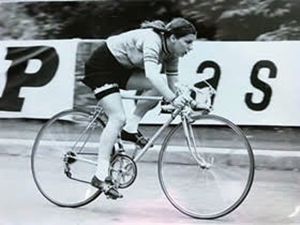 "For services to cycling time trials". "For services to cycling time trials".
Sheila has had a lifetime in cycling,
being National Chairman of CTT for over 13 years, a Board Director
(1997 - 2021), the Midland District Assistant Secretary - Open
Events since 1997, Organiser of two RTTC National Championships
(National Junior 10 mile (1993), and National Team Time Trial
Championships (2023)), of being a Midland DC Committee member since
1992, and promoted numerous time trial events over the years. A
continuous theme of Sheila's life in cycling is the safety of riders
and all those involved in a time trial being paramount. |
2022 - Cherie Pridham (Lotto-Dstny):
”For being the first female Sports
Director of a Men’s UCI World Tour Team”.
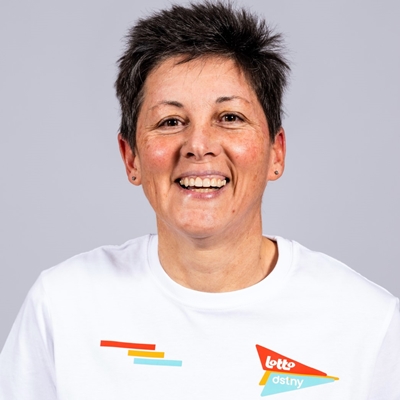 The nomination was also made in conjunction
with her pathway, following a successful racing career, being a UCI
Continental-level team manager through to her role as a ‘Grand Tour’
Sports Director. The nomination was also made in conjunction
with her pathway, following a successful racing career, being a UCI
Continental-level team manager through to her role as a ‘Grand Tour’
Sports Director.
Cherie replied:
"To say I am honoured to receive this
prestigious award is something of an understatement. Having studied
the roll call of previous winners I feel very privileged to be
associated with some of cycling’s true icons. Whilst the long
standing Bidlake award stretches back to a bygone era it is
abundantly clear that it has kept up with the ever changing
landscape within professional cycling by acknowledging the role that
women now play in our sport.” |
2021 -
Alex Dowsett (Israel
Start-Up Nation):
“Former World Hour Record Holder and Grand Tour Stage Winner for
raising the awareness of haemophilia in sport, and his charity
“Little Bleeders”, as he is the only known able-bodied sport person
to compete at Elite level with this condition.” |
2020 - Jonathan Shubert (Artic – Aircon RT):
“In November 2020, Jonathan Shubert set a new RRA 100-mile
‘straight out’ record in a time of 2 hours, 57 minutes, 58 seconds,
breaking the previous record of 27 years and becoming the first man
under the three-hour barrier." |
2019 - John Barclay (Festival Road Club):
“For his outstanding voluntary work, in taking young riders
to Europe and inspiring them to achieve their potential.” |
2018 - Michael Broadwith (Artic – Tacx RT):
“For his extraordinary and inspiring achievement in breaking
the End-to-End record with a time of 1 day, 19 hours, 25 minutes, 13
seconds.” |
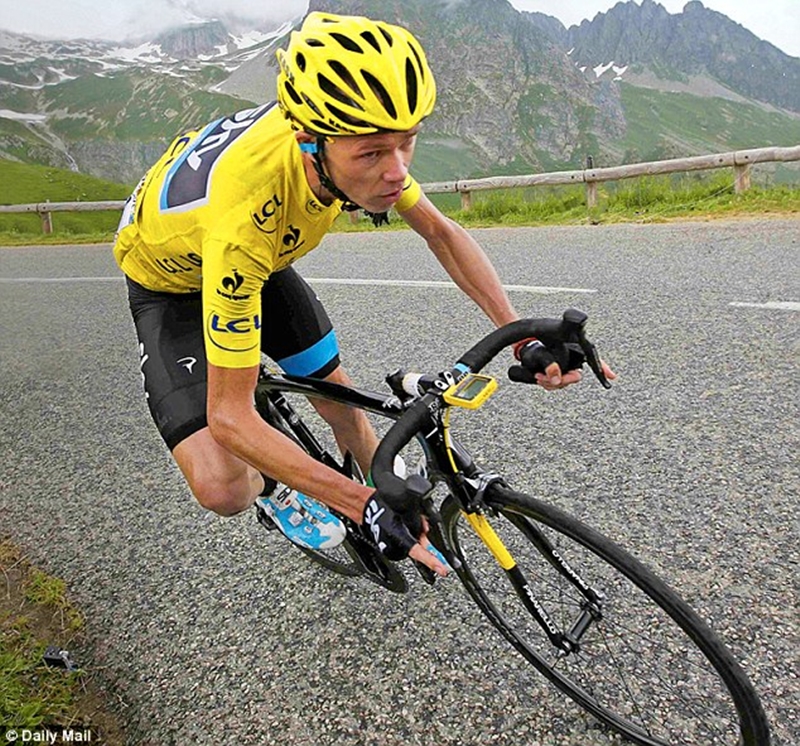
2017 - Chris Froome. Awarded to Chris Froome in
recognition of his achievement of winning the Tour de France for the
fourth time, then being the first British rider to win the Vuelta a
España in the same year. |
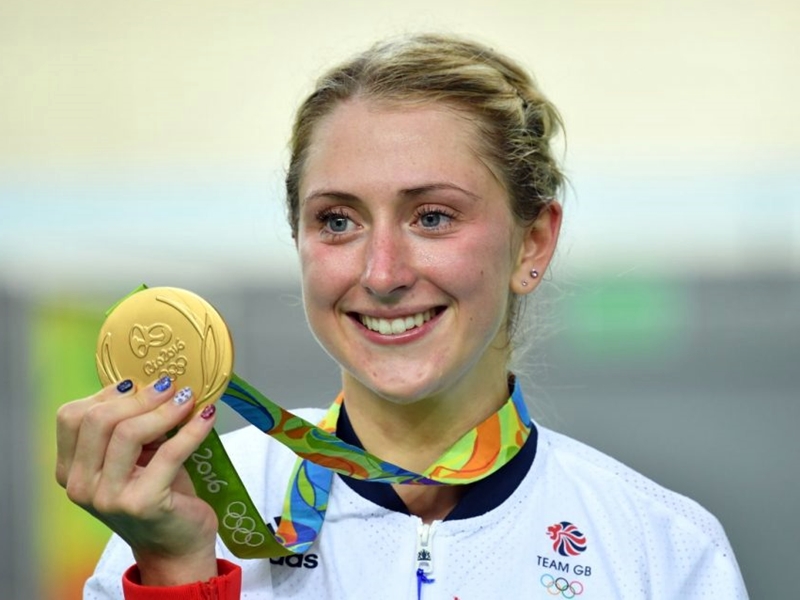
2016 - Laura Trott.
Awarded to Laura Kenny in recognition of her achievements as
Britain’s most successful Olympic female competitor in any sport. |
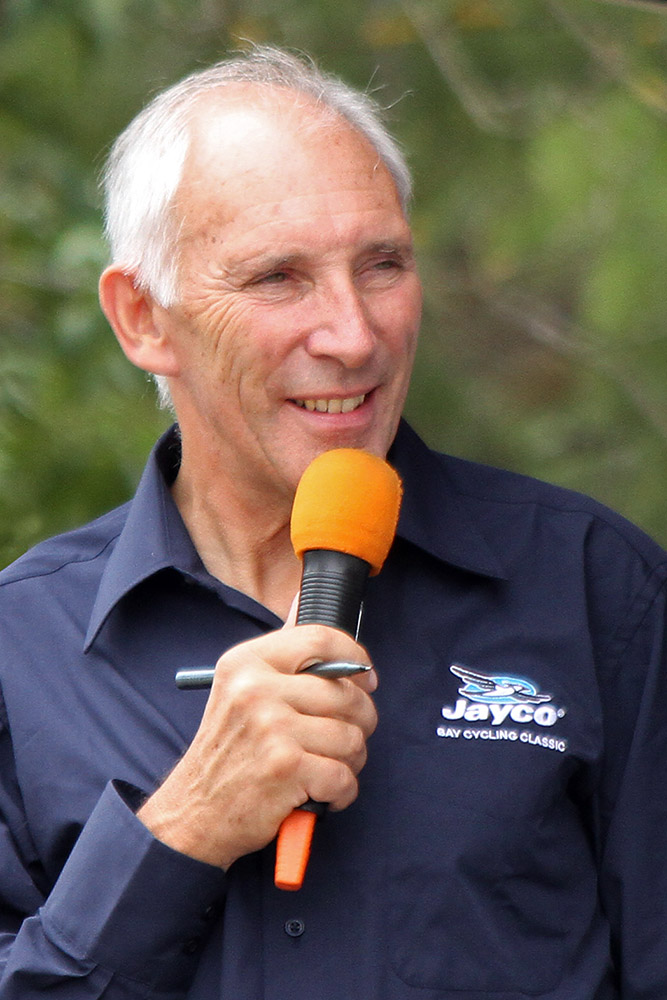
2015 - Phil Liggett MBE,
was awarded 2015 FT Bidlake
Memorial Prize for a lifetime of services to cycling. |
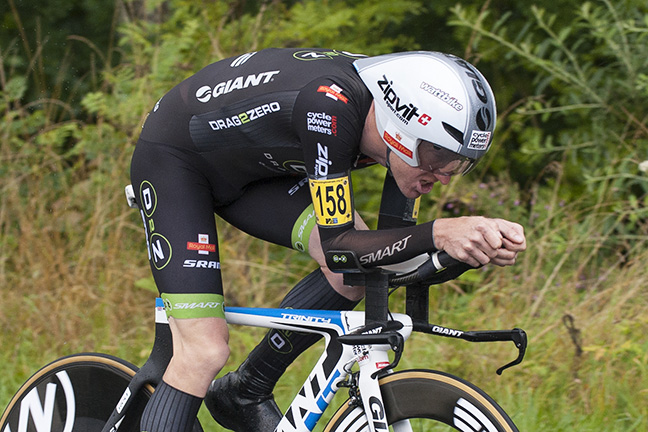
2014 - Matt Bottrill. Awarded to Matthew Bottrill who won
the Men's National Championships at 10, 25 and 50 miles, the RTTC
Circuit Championship, breaking three competition records and being
crowned Champion of Champions. |
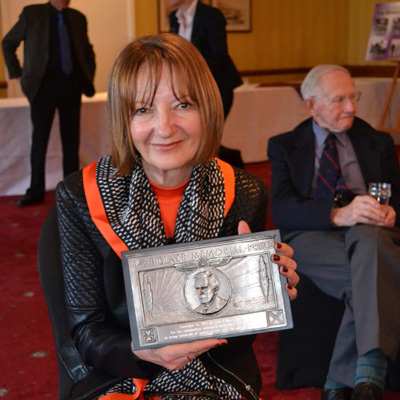
2013 - Dot Tilbury had for over
twenty years organised junior cycling events, competitive and
non-competitive, in the Isle of Man. These events have brought
thousands of young people into the sport, among them Mark Cavendish,
and they are a reminder that cycling has to begin at grass roots
amateur level. Dot’s award recognises the dedication of all the
people who work in this way to ensure that the sport continues and
has a future, and not only for Olympic or World Champions.
|
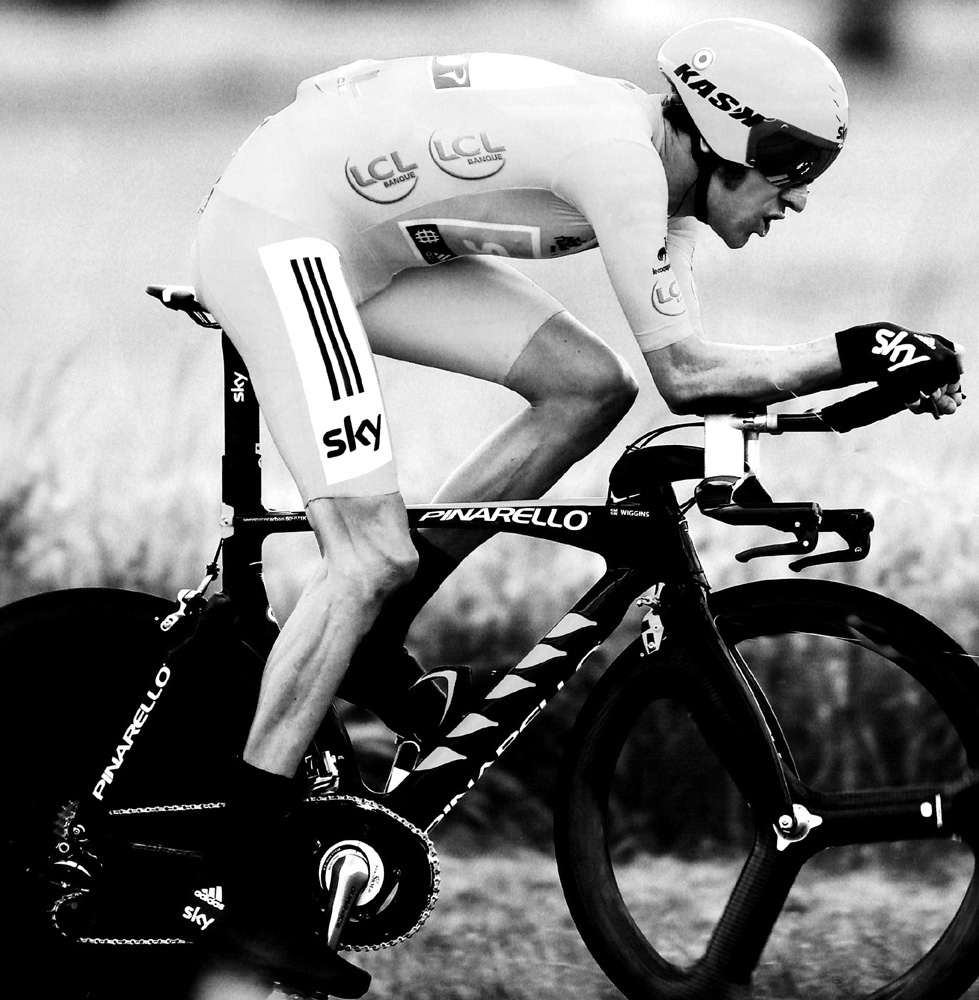
2012 - Sir Bradley Wiggins achieved
what had seemed to be an impossibility: he became the first
Englishman to win the Tour de France. Before concentrating
exclusively on road racing, Wiggins had already won the individual
pursuit gold medal at both the Athens and the Beijing Olympics. One
week after his Tour victory, he took the gold medal in the London
Olympic time-trial, to become unquestionably the all-time king of
British cycling, his uniqueness recognised in his knighthood
announced later that year. |
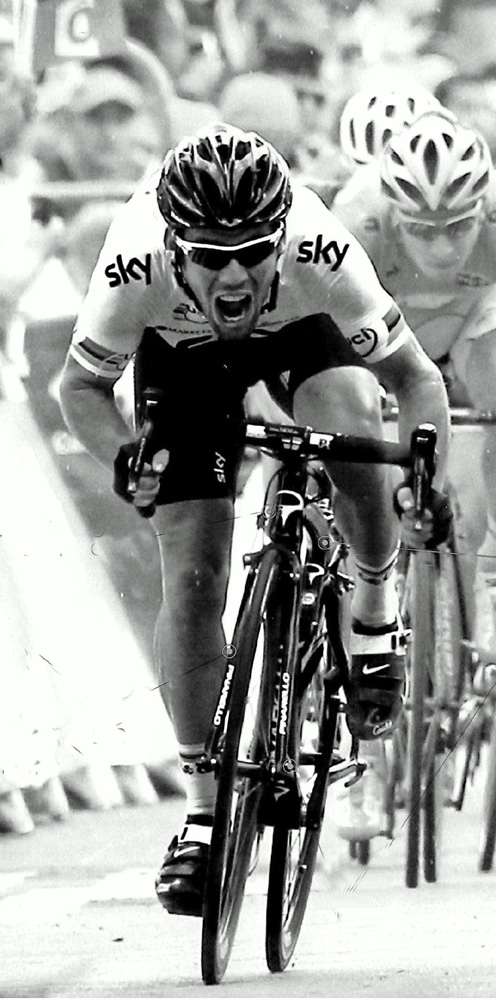
2011 - Mark Cavendish won the World
Professional Road Race, only the second British rider ever to take
this title. Cavendish had already become the most successful road
sprinter in the world, with multiple stage-wins in the Tour de
France and the Giro d’Italia to his credit. |
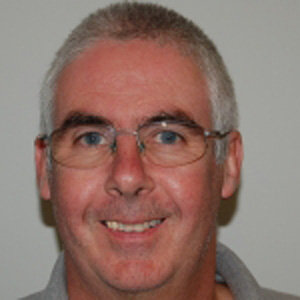
2010 - Philip Heaton’s
award was for
his outstanding contribution to the sport, as National Secretary of
Cycling Time Trials, formerly the RTTC. |
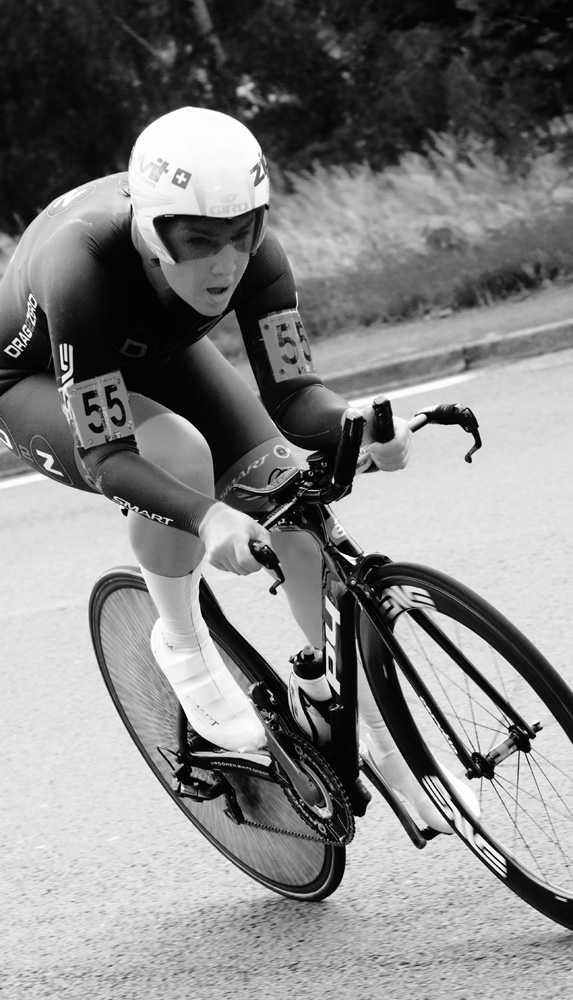
2009 - Julia Shaw was the dominant
figure in women’s time-trialling from 2006–2012. In 2009 she won the
women’s BBAR at a record average speed of 27.451 mph, taking four
national championships and breaking two competition records. |
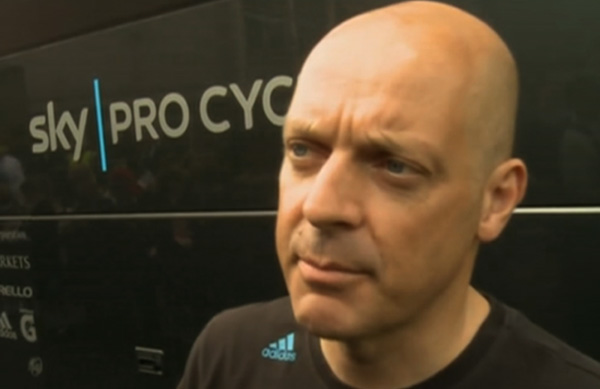
2008 - Dave Brailsford CBE, for his
role as Performance Director of British Cycling, in leading the
Great Britain team to unprecedented success at world level on road
and track. |
|
2007 - Peter King was rewarded for
his management and leadership skills in reviving the fortunes of the
B.C.F., now British Cycling, over the past decade. |
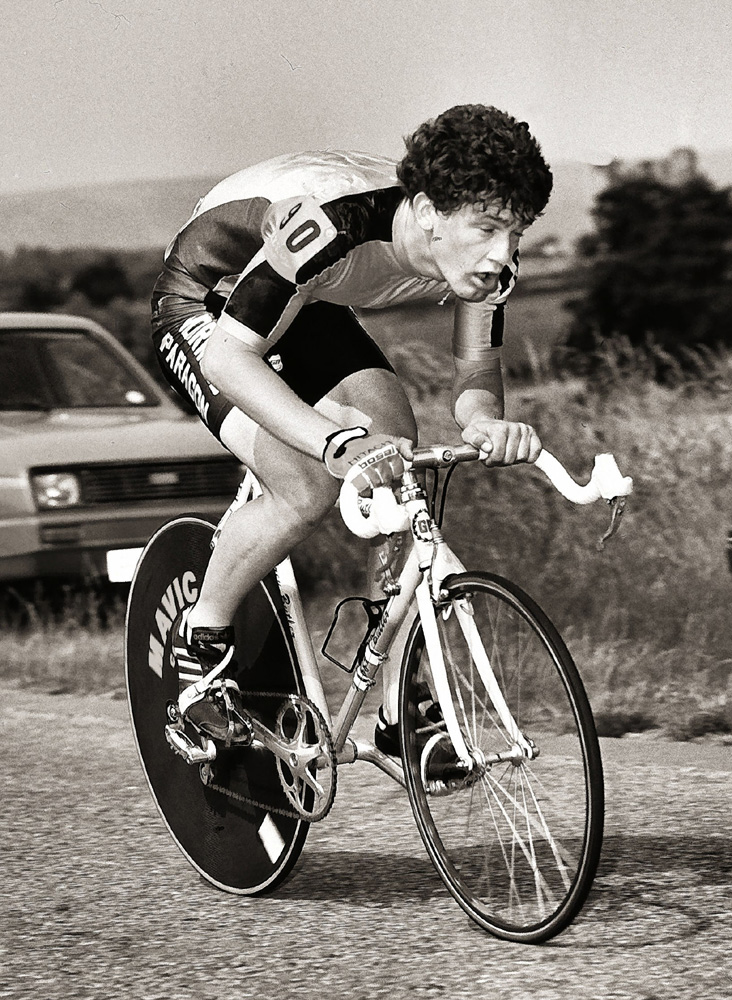
2006 - Gethin Butler was given his
award officially for his victory on this year’s National Time-Trial
Series. But this was probably another retrospective award,
recognising his two BBAR titles from 1994 and 1995, his many
National Championship victories at 100 miles, 12 hours and 24 hours,
and his superb End-to-End and 1000-mile record rides in 2001. |
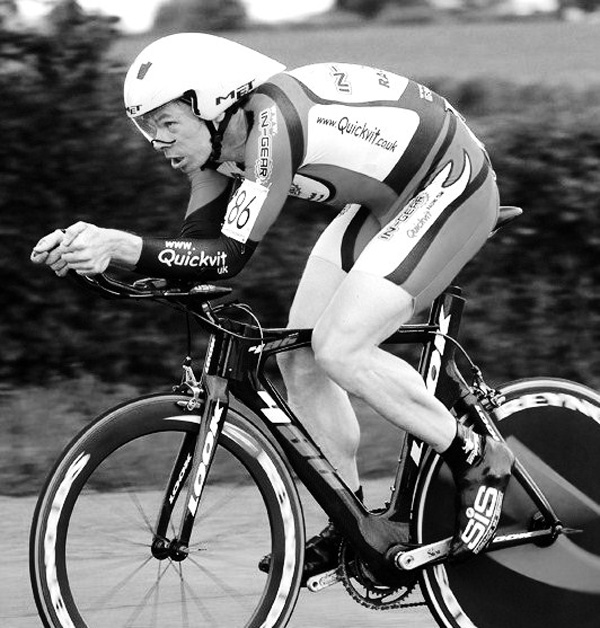
2005 - Michael Hutchinson was the
most consistently successful time-triallist of the years 2000-2012.
In 2005 he achieved an astounding string of victories, winning five
National Championships from 10 miles to 12 hours, plus the BBAR
title. |
 2004
- Ron Webb,
for his work as
designer and builder of more than sixty indoor racing tracks
worldwide, including Manchester. The latter played a key role in the
development of top-level British track performance, seen at the
successive Olympics in Sydney 2000, Athens 2004 and Beijing 2008. He
was the natural choice to build the London 2012 Olympic velodrome.
Webb, himself a former trackman, was the second Australian to be
given the award, exactly seventy years after Hubert Opperman. 2004
- Ron Webb,
for his work as
designer and builder of more than sixty indoor racing tracks
worldwide, including Manchester. The latter played a key role in the
development of top-level British track performance, seen at the
successive Olympics in Sydney 2000, Athens 2004 and Beijing 2008. He
was the natural choice to build the London 2012 Olympic velodrome.
Webb, himself a former trackman, was the second Australian to be
given the award, exactly seventy years after Hubert Opperman.
|
| 2003 - There was no award.
|
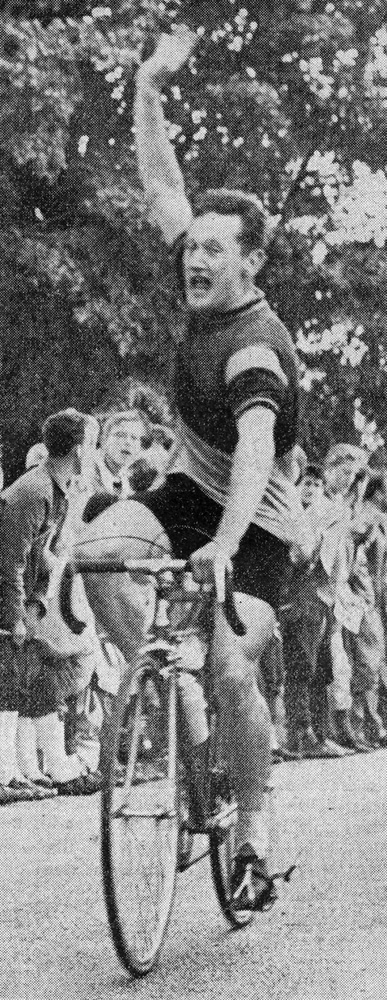
2002 - Keith Butler is the founder and moving spirit
behind the Surrey Cycle Racing League, which for over twenty years
has organised a full programme of road-racing, especially at grass-
roots level. |
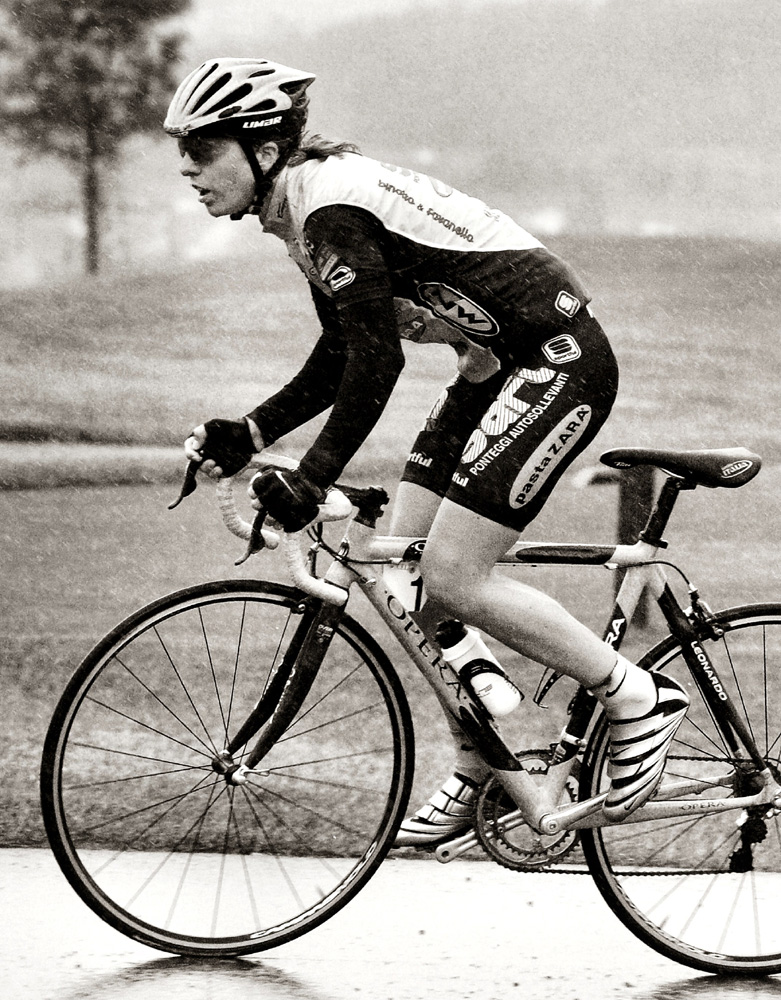
2001 - Nicole Cooke, the only junior ever to be
awarded the Bidlake, no one could ever have done more to deserve it.
Nicole won three Junior World Championship gold medals – the
time-trial, the road race, and the mountain bike race, having
previously won the road-race in 2000. The highlight of her career
would come in the 2008 Olympics when she won the road-race in such a
thrilling fashion. She also won the women’s Tour de France two years
running. |
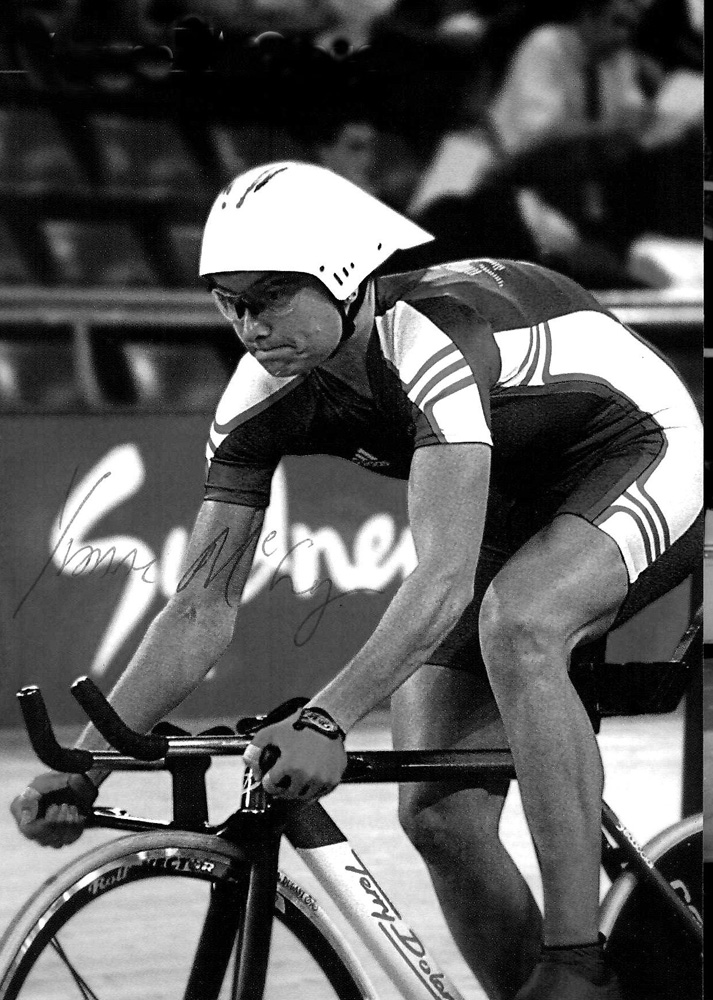
2000 - Yvonne McGregor was one of
Britain’s most successful ever women racers. In this year she won
the pursuit bronze medal at the Olympic Games in Sydney, and took
gold in the same event at the World Track Championships. |
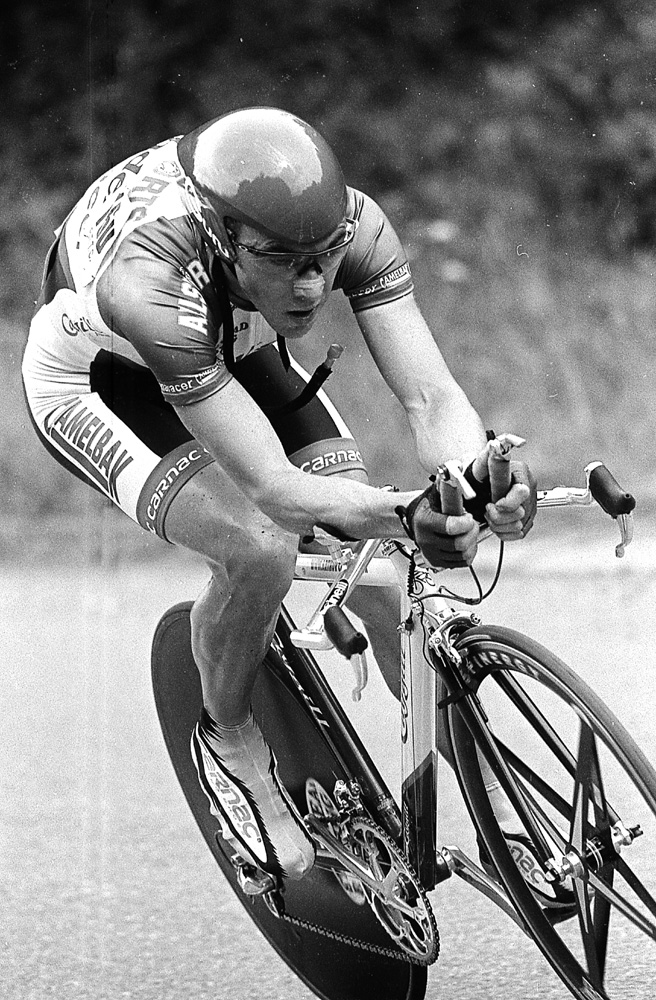
1999 - Kevin Dawson won his fifth
BBAR title in this year, and took the silver medal in the National
Road Race Championship – thus coming closer than anyone else to
repeating Arthur Metcalfe’s feat of 1966. Dawson would go on to
become all-time king of the BBAR with eleven victories. |
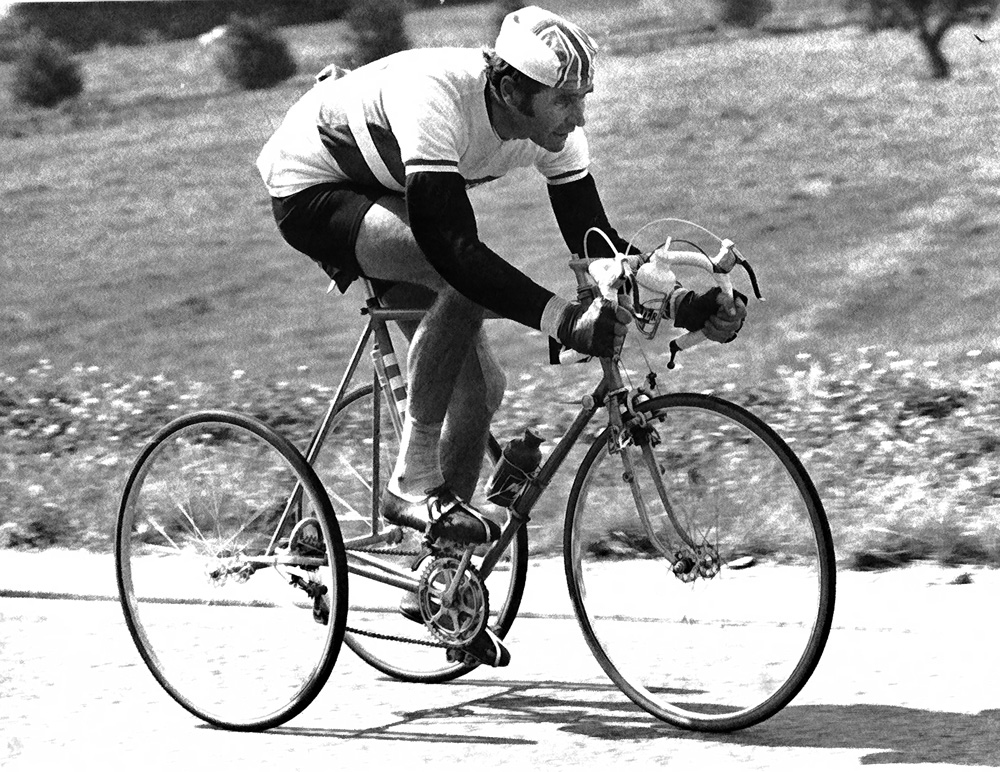
1998 - David Duffield had become the
most famous and best-loved television cycling commentator, for his
ability to spin an endless story through hours of racing.
|
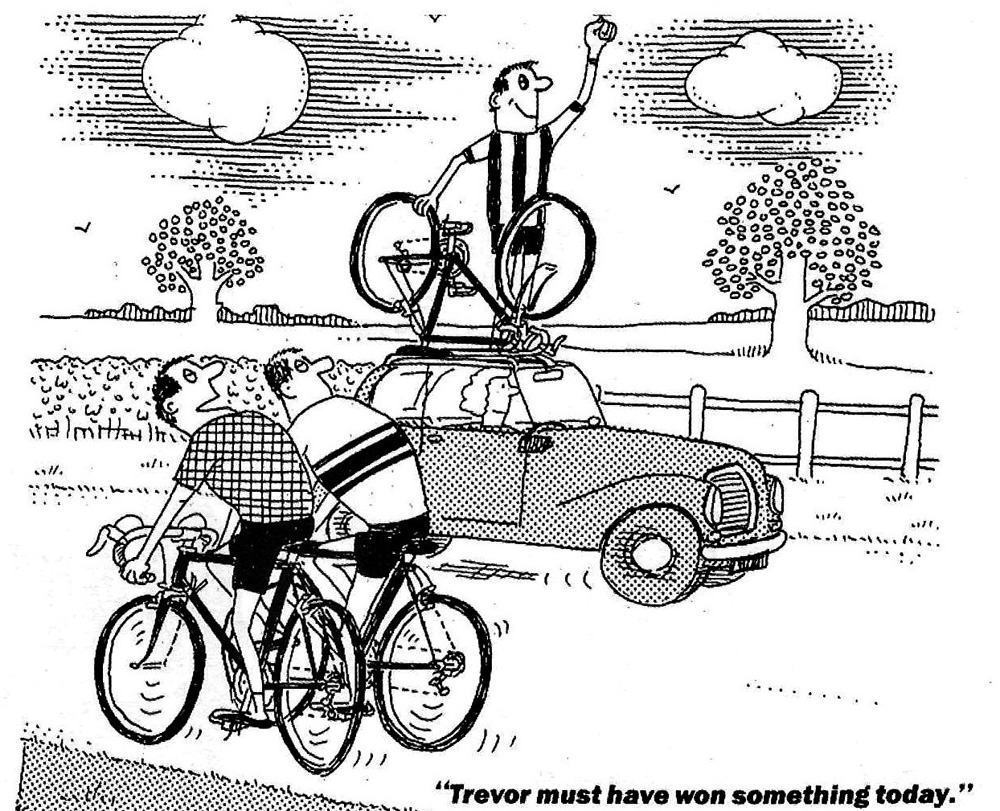
1997 - Johnny Helms was the second
artist, after Frank Patterson, to be given the Bidlake award.
Helms’s delightful cartoons had appeared in Cycling Weekly for over
fifty years, and had become part of the mental landscape of every
British cyclist. The antics and humiliations of his anti-heroes, Baz
and Honk, expressed the eternal frustrations and the rare triumphs
of the common man-on-a-bike. |
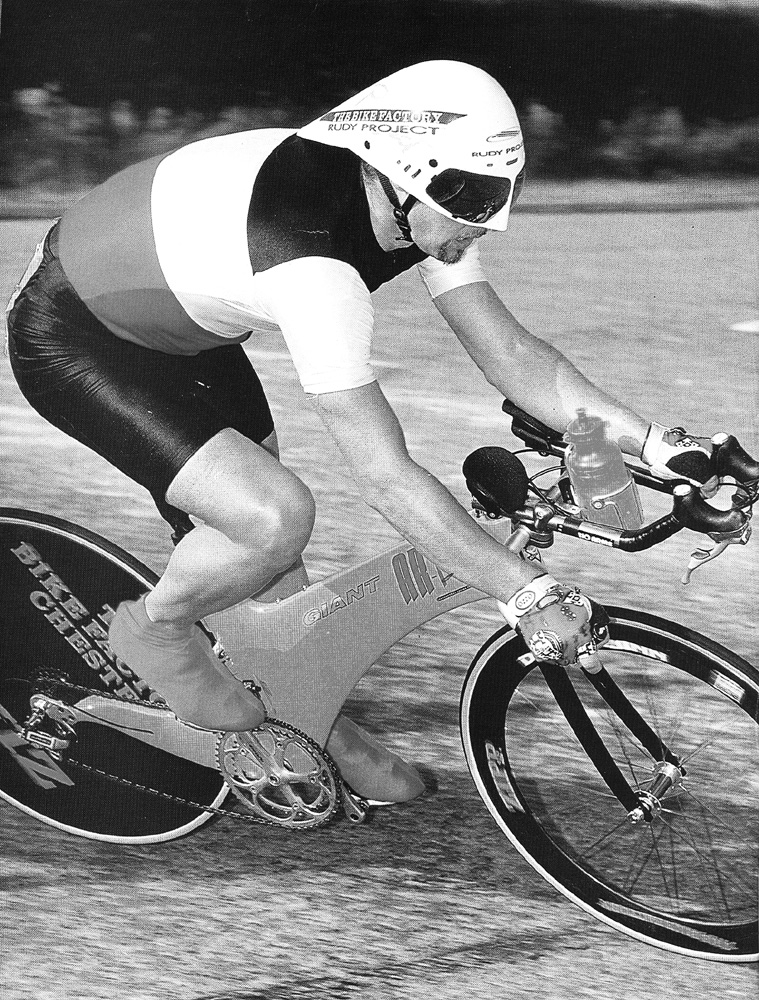
1996 - Andy Wilkinson took the BBAR
title in the most convincing style ever seen, setting new
competition records at all three distances, as well as winning
National Championships at 100 miles and 12-hours. At this date he
was also the End-to-End record holder. |
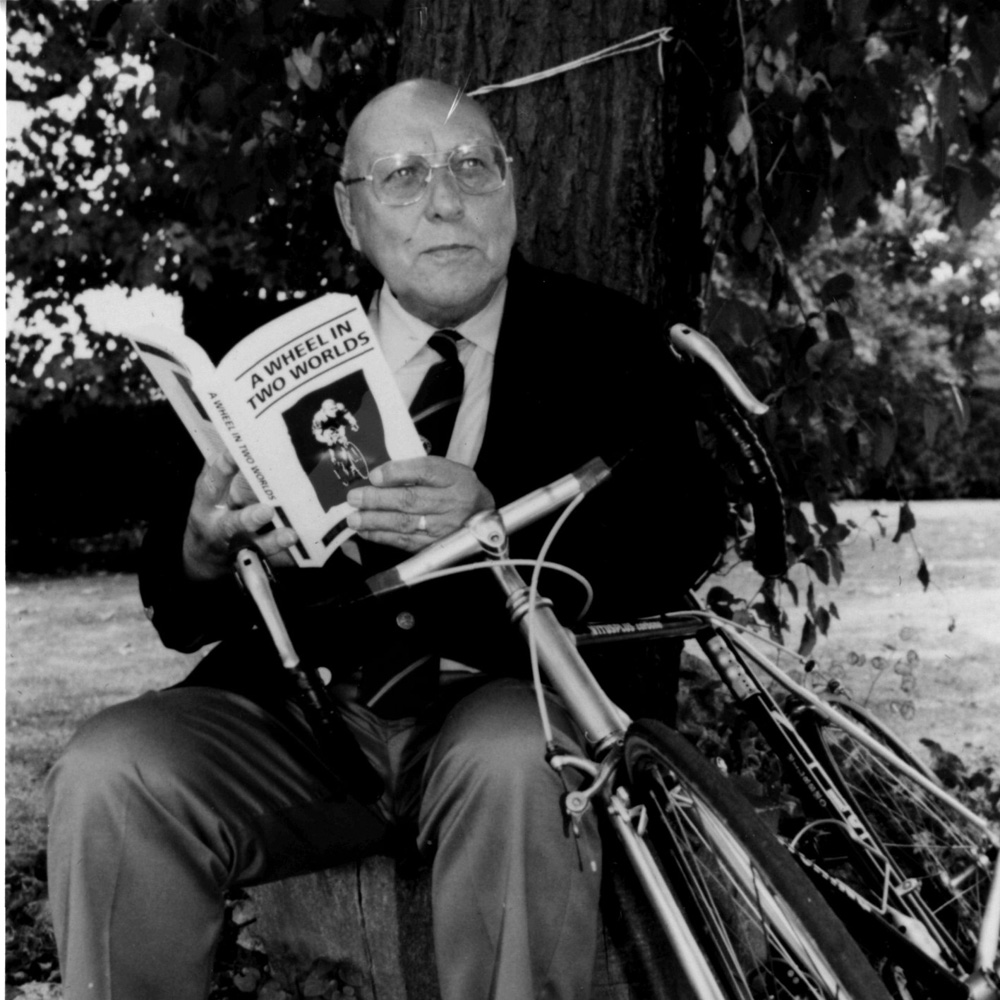
1995 - Ron Kitching was a highly
successful bike-dealer, known as “Mr.Everything Cycling,” who used
his wealth to encourage and promote many aspects of the sport. In
1995 he sponsored the 50-mile time-trial that marked the centenary
of the sport founded by Bidlake himself in 1895. |
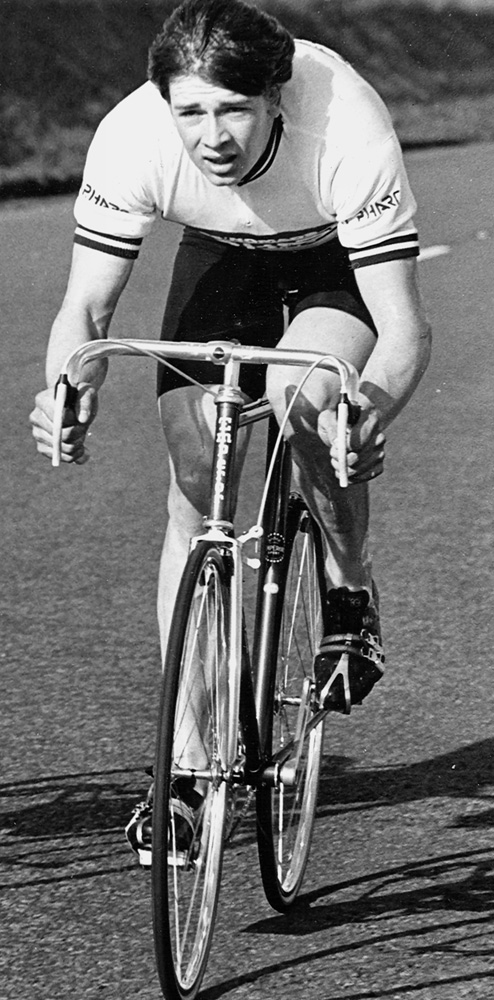
1994 - Sean Yates held the yellow
jersey in the Tour de France this year, the culmination of his long
and successful career of professional racing on the continent.
|
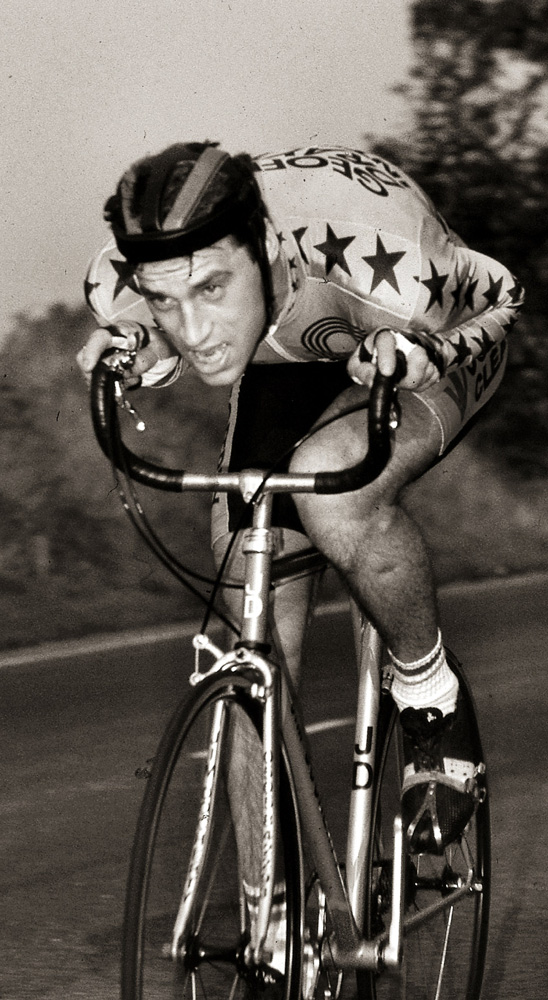
1993 - Graeme Obree. Exactly
contemporary with Boardman, Obree also broke the World Hour Record.
He defeated Boardman for the World Pursuit Championship, and, in
domestic competition, set new time-trial records at 10 miles and 50
miles. Obree was a self-taught individual genius, who rode a bike of
his own unique design. |
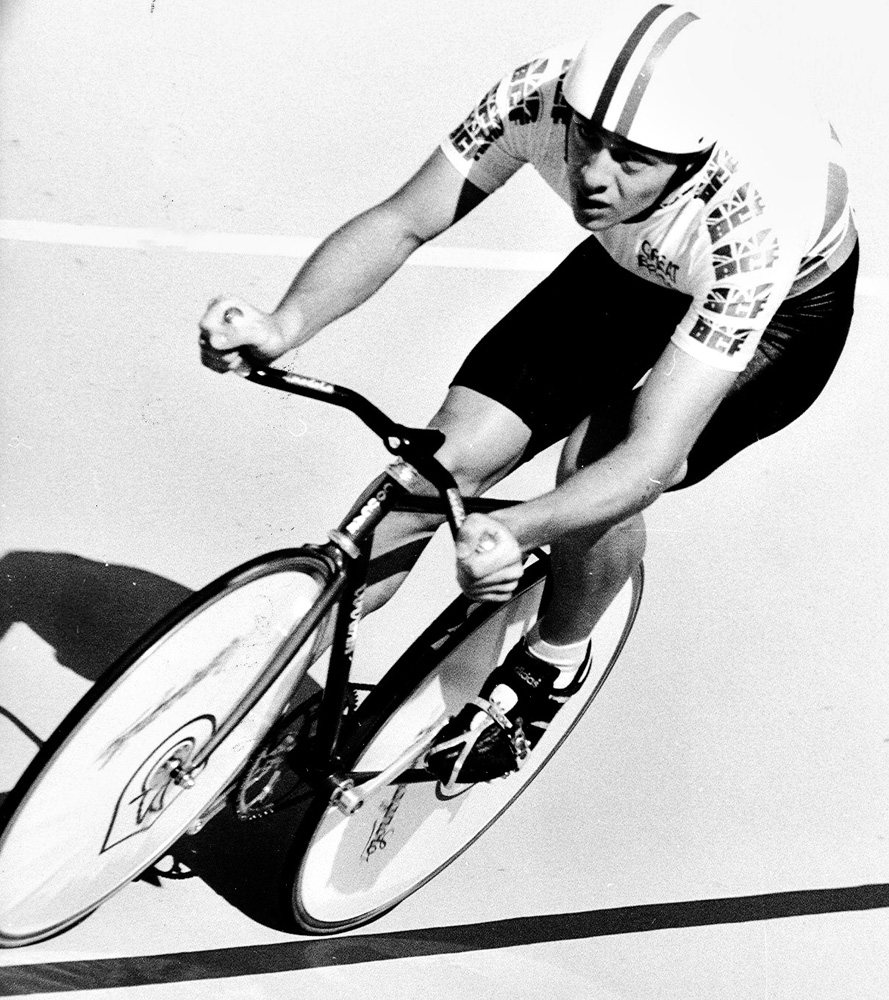
1992 - Chris Boardman. Boardman won
the Olympic Pursuit title in Barcelona with a sensational ride on
his revolutionary Lotus bike. This was Britain’s first individual
Olympic cycling gold medal since 1908. Boardman would later break
the World Hour Record and win three Tour de France prologues. His
career was probably the most influential ever seen in British
cycling, raising the profile of bike-racing to a new level of public
awareness. |
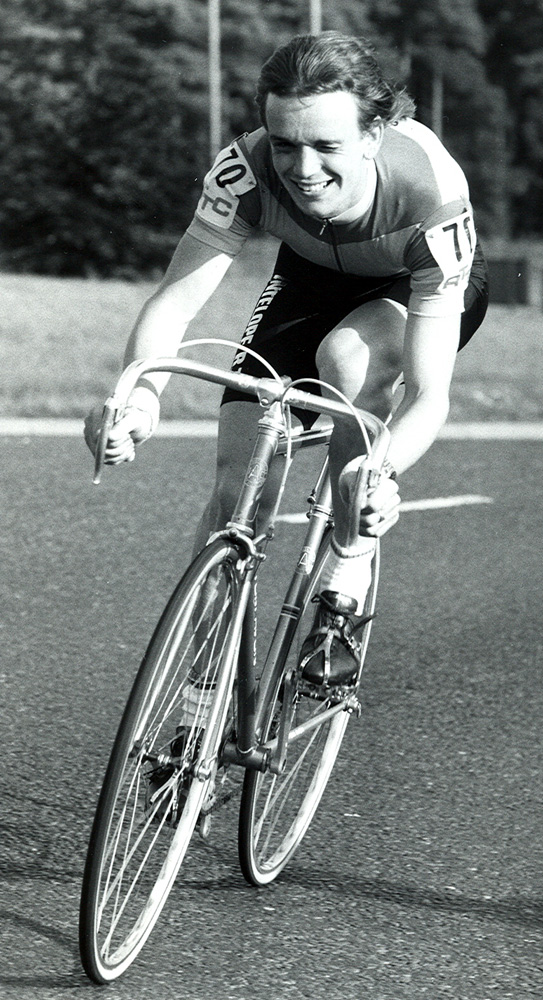
1991 - Glenn Longland broke a
classic time-trial barrier which many had thought impossible,
becoming the first man to top 300 miles for the 12-hour. This great
ride helped to give him BBAR title for this year. |
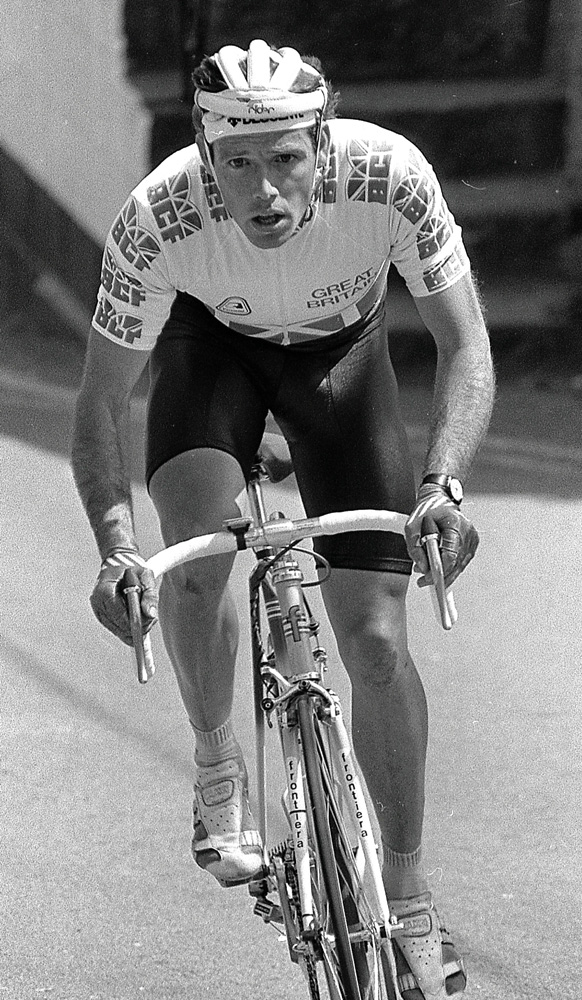
1990 - Pete Longbottom was an
all-round roadman, whose award was given for multiple time-trial
achievements in this year: he won the National 100-mile
Championship, broke the national 25-mile record, becoming the second
man ever inside 50 minutes, and he set a new RRA 50-mile record of
1:30:14. |
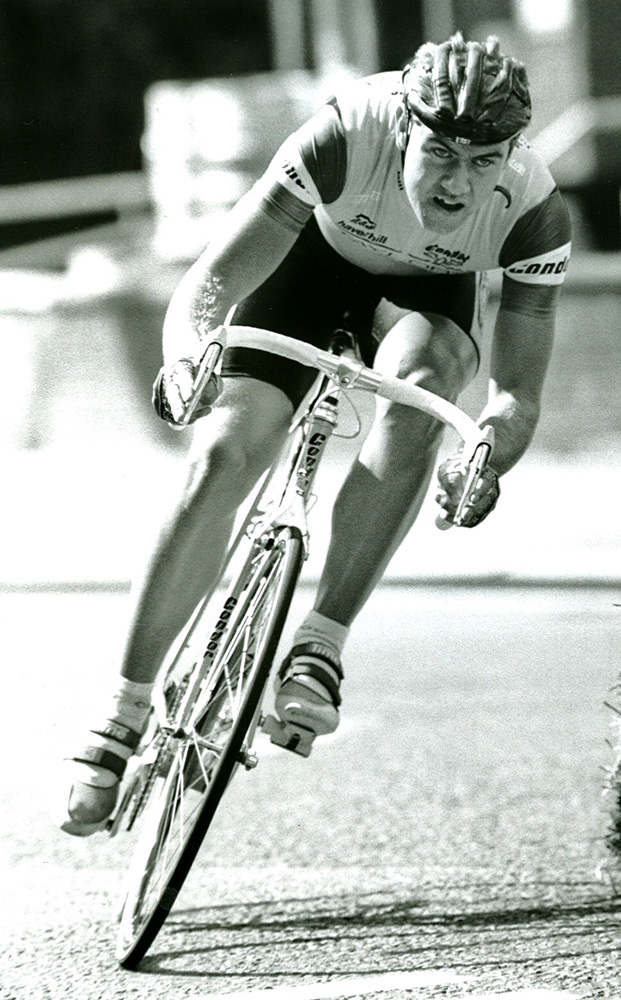
1989 - Colin Sturgess, for his
brilliant victory in the World Professional Pursuit Championship, at
the age of twenty. |
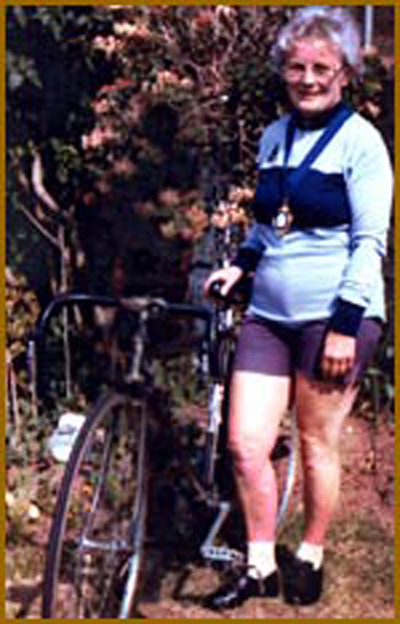
1988 - Ivy Thorp, President of the
Cyclists’ Touring Club, for her dedicated work for the welfare of
cyclists at local and national level. |
| 1987 - There was no award. |
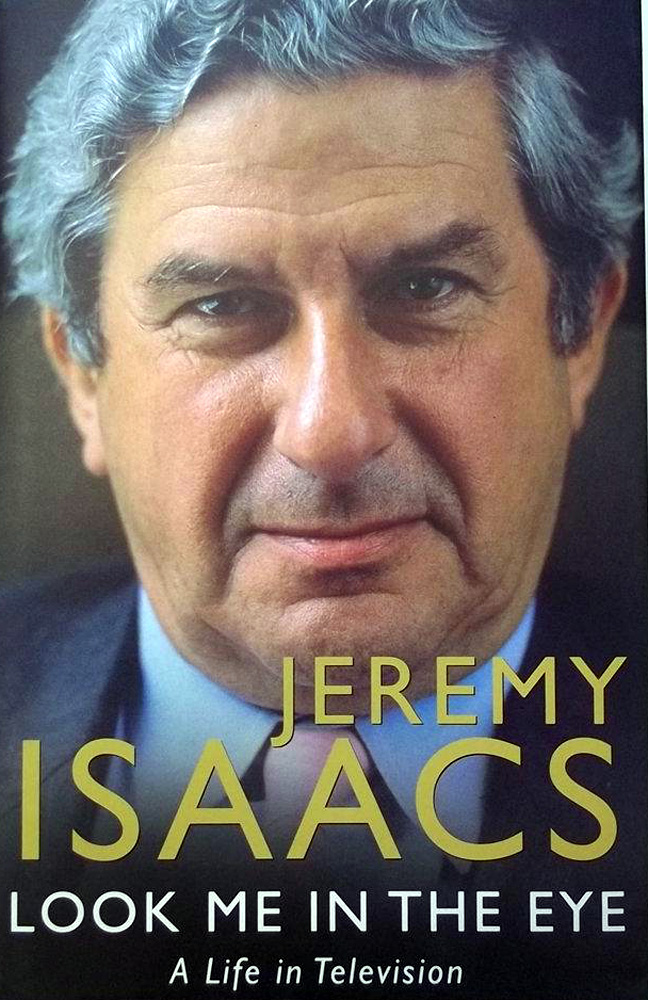
1986 - Jeremy Isaacs
was the head of
Channel Four television who inaugurated a new era in the public face
of cycling when he televised the Tour de France, which has remained
a summer TV fixture ever since. |
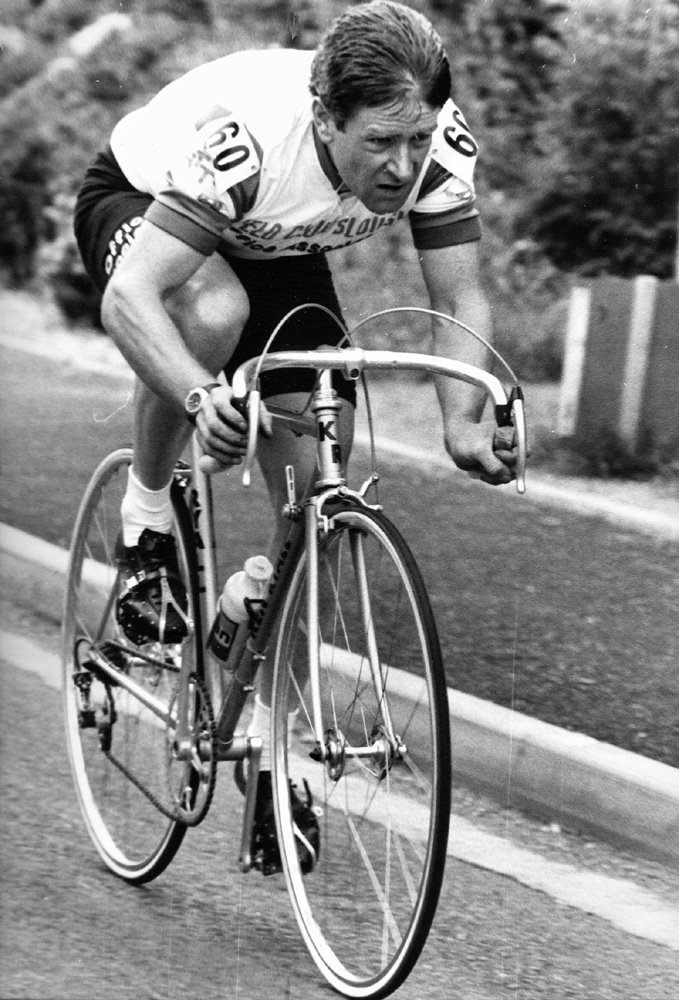
1985 - John Woodburn.
In this year
Woodburn won the VTTA BAR title for the third time, but his award
was probably in recognition of his many years of outstanding
time-trialling achievements, from the National 25-mile Championship
back in 1961, to his End-to-End record in 1982. Woodburn was the
original super-vet. |
| 1984 - There was no award. |
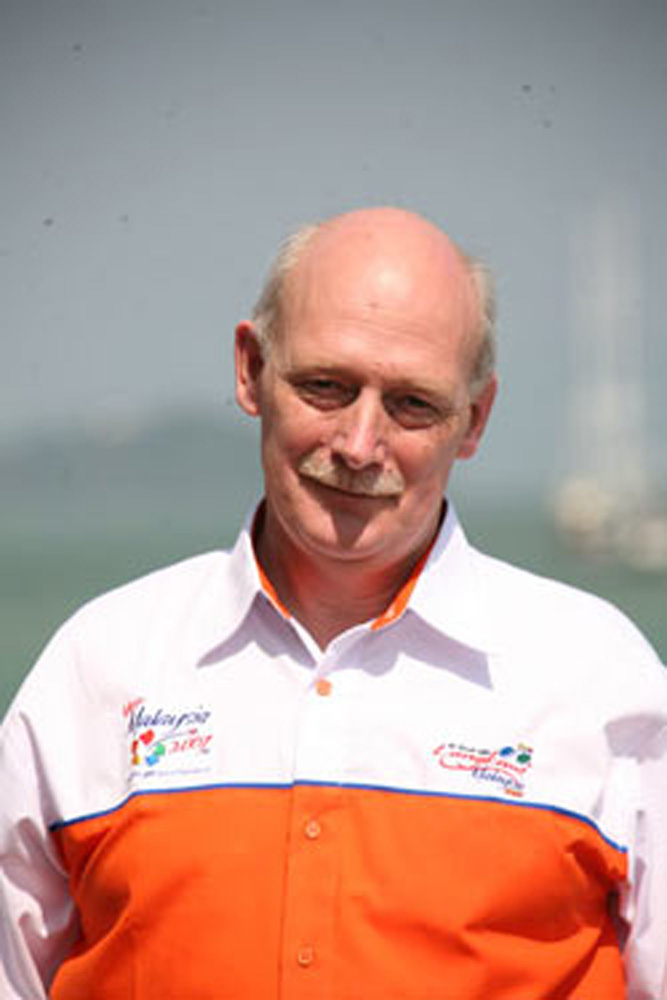
1983 - Alan Rushton made a huge
impact on the public perception of bike-racing when he organised his
series of city-centre criteriums, contested by the country’s leading
professionals, and had them broadcast on television. |
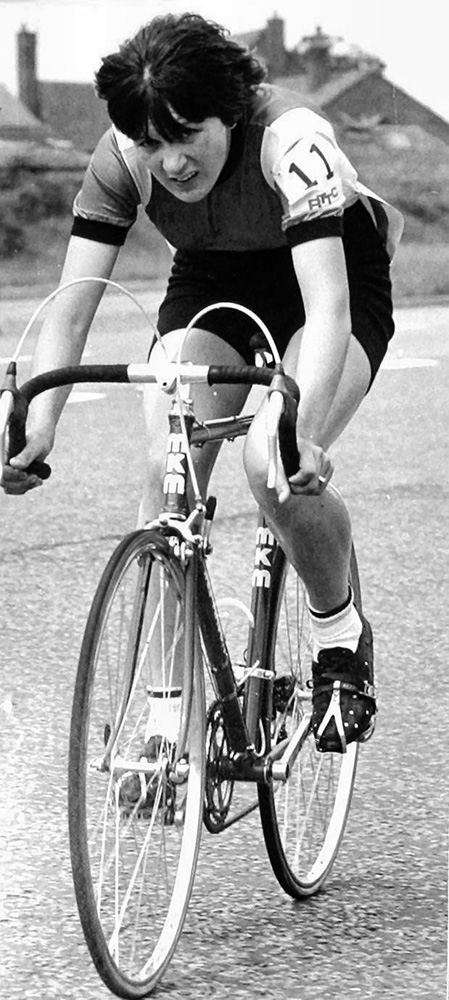
1982 - Mandy Jones won an
outstanding solo victory in the Women’s World Championship road-race
at Goodwood, at the age of only twenty. As a time-triallist and
road-racer, her successes marked the opening of the post-Beryl
Burton era. |
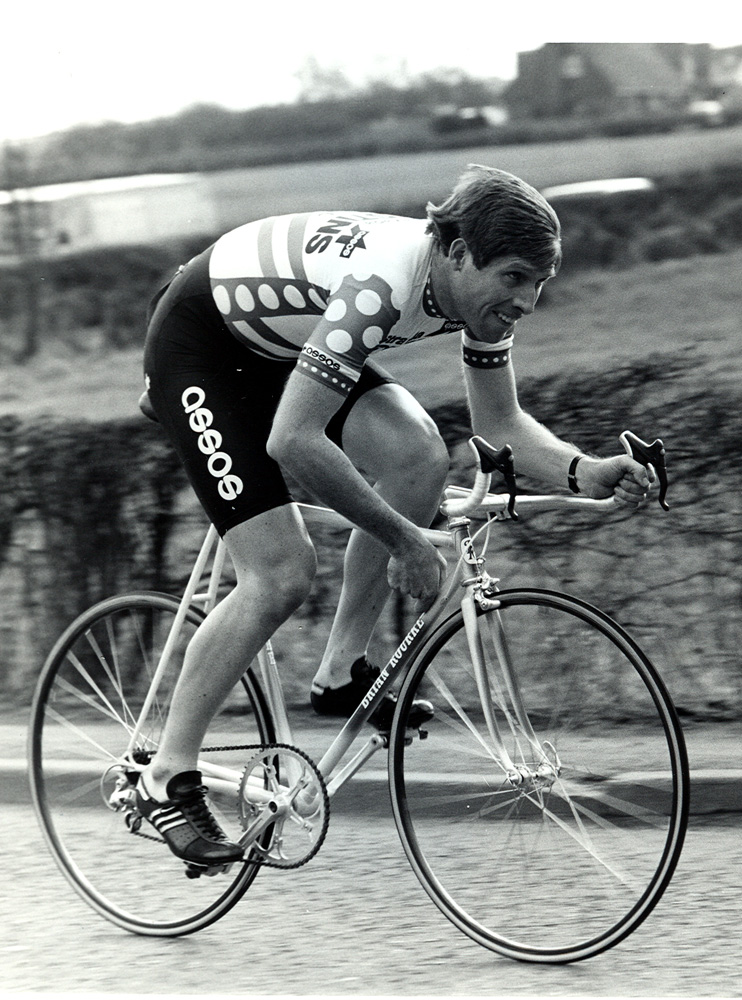
1981 - Ian Cammish.
A giant of
time-trialling in the mould of Southall and Booty, Cammish won the
100 championship in a competition-record time, and also put up the
five fastest 100 times of the year. He would go on to many more
championship victories and even faster records, becoming one of
those riders who have been given the Bidlake award before they
achieved their greatest feats. |
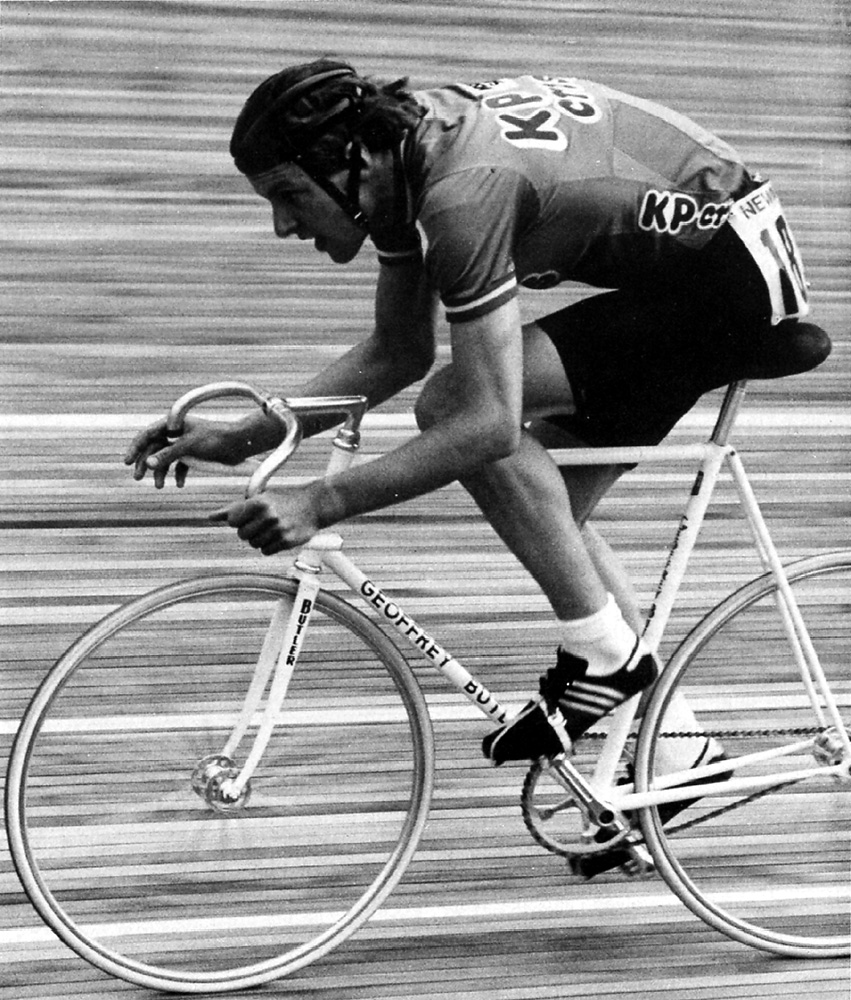
1980 - Tony Doyle won the World
Professional Pursuit Championship at Besancon. The story of his
victory had a dramatic background, for he had travelled to the
Moscow Olympics one month earlier, but was not selected to ride the
individual pursuit, despite being British National Champion at this
discipline. He made his feelings clear by immediately turning
professional and taking the world title. Doyle would go to become
the most successful British rider ever in the International Six-Day
circuit. |
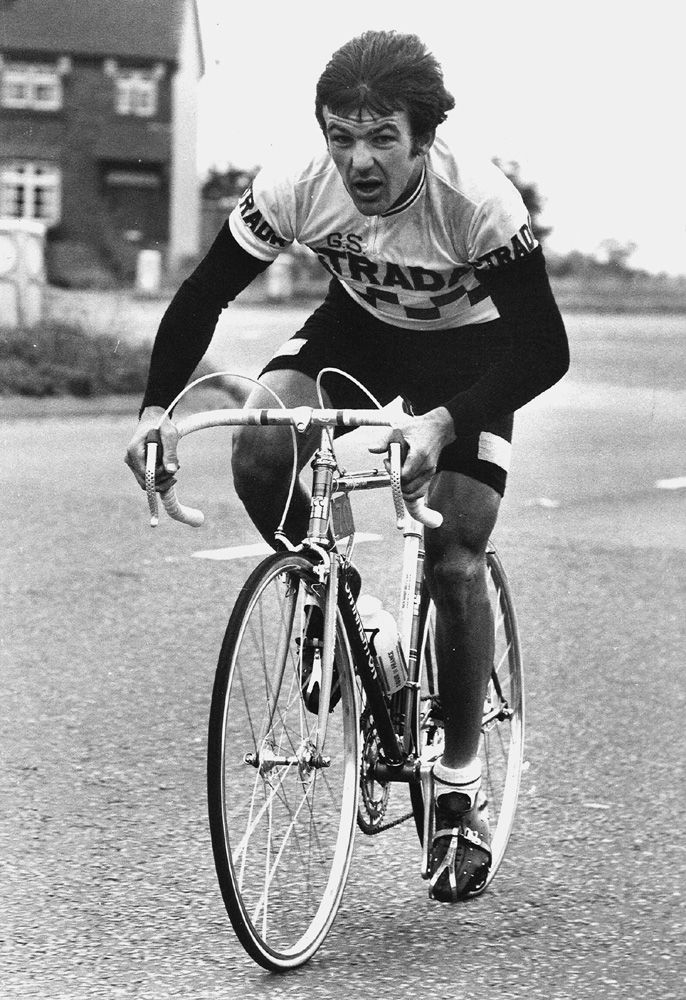
1979 - Paul Carbutt broke the
End-to-End record in a courageous ride, during which he collapsed,
virtually unconscious with heat exhaustion, but pulled himself round
to finish in 1:23:23. Carbutt had been BBAR champion in 1976, a
highly-placed Milk Race rider, then turned professional for Viking.
|
| 1978 - Leslie C. Warner
received the
award for his dedicated work over several decades in the interests
and cyclists and in defence of their rights. |
| 1977 - Arthur Campbell
was one of
the sport’s senior administrators, President of the Scottish
Cyclists Union and the of the British Cycling Federation. He was
appointed chairman of the UCI’s technical commission in 1977. In the
1940s Campbell had raced as a roadman in the pioneer days of the
BLRC. |
| 1976 - Ron White was given the award
for his efforts over many years to have a cycle track built in
Harlow, Essex. This became a reality and was opened in 1976. |
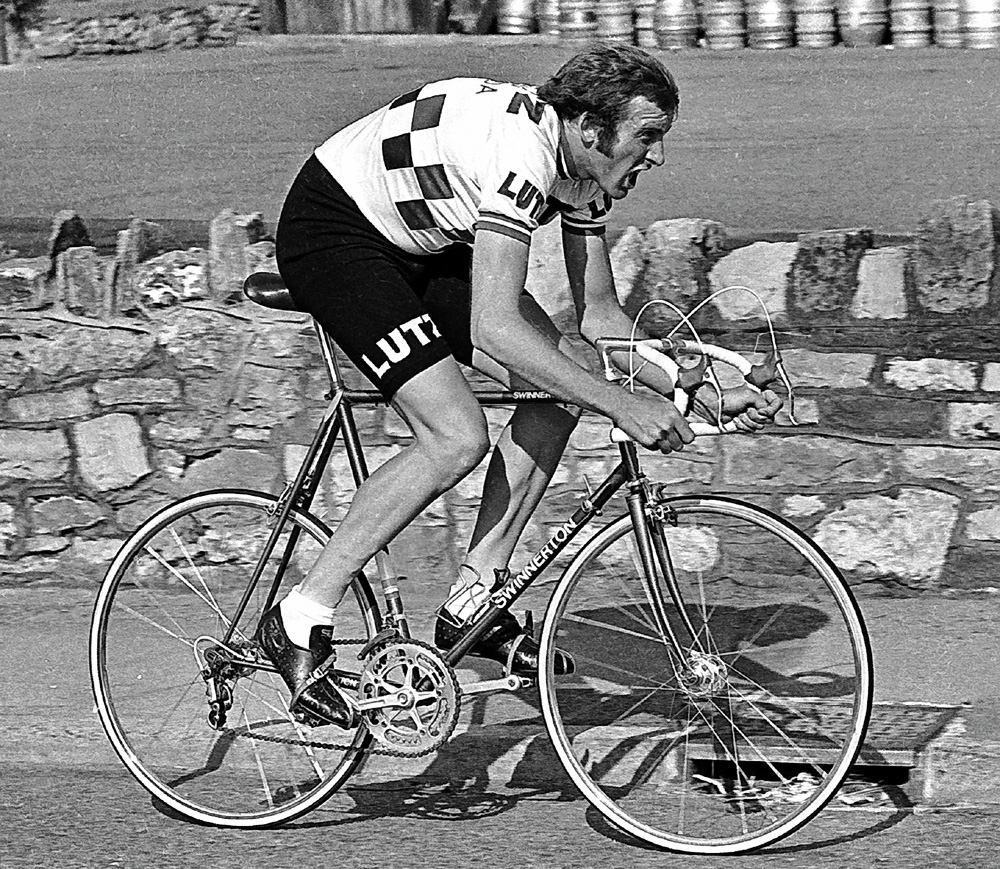
1975 - Phil Griffiths had showed
himself to be the dominant time-triallist of the 1970s at the BAR
distances, by taking three BAR titles, two of them in succession. He
would win two more BBAR titles, as well as many National
Championships, and breaking many RTTC and RRA records. |
| 1974 - There was no award.
|
| 1973 - William H. Townsend
had been
an outstanding administrator in cycle sport for two decades as
Chairman of the RTTC. In the late 1950s the government of the day
was drafting new road traffic legislation, and it was thanks to Will
Townsend’s representations that time-trialling, although taking
place on public roads, was able to kept its special position outside
police control, with no official permission required to stage one.
|
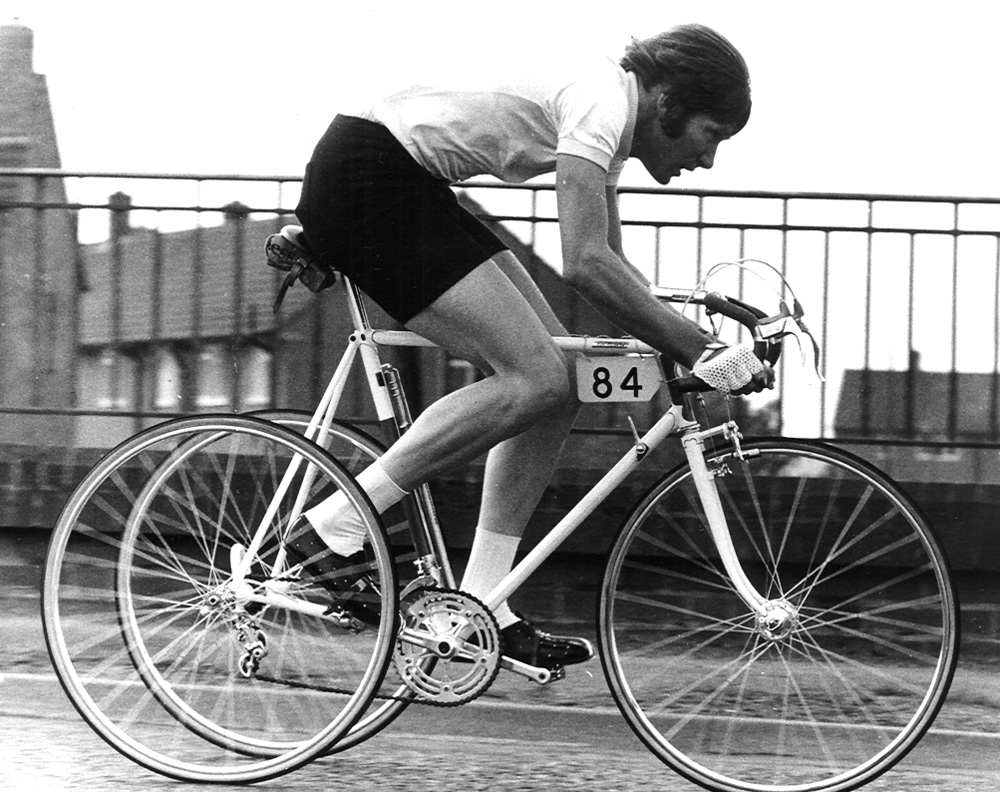
1972 - Eric Tremaine set a new
24-hour trike record of 457.89 miles, at last up-dating John
Arnold’s 19-year-old time. It’s worth remembering however, that
Tremaine added just half a mile to Arnold’s figures, for a record
which still stands today. Tremaine would later take the End-to-End
trike record too. |
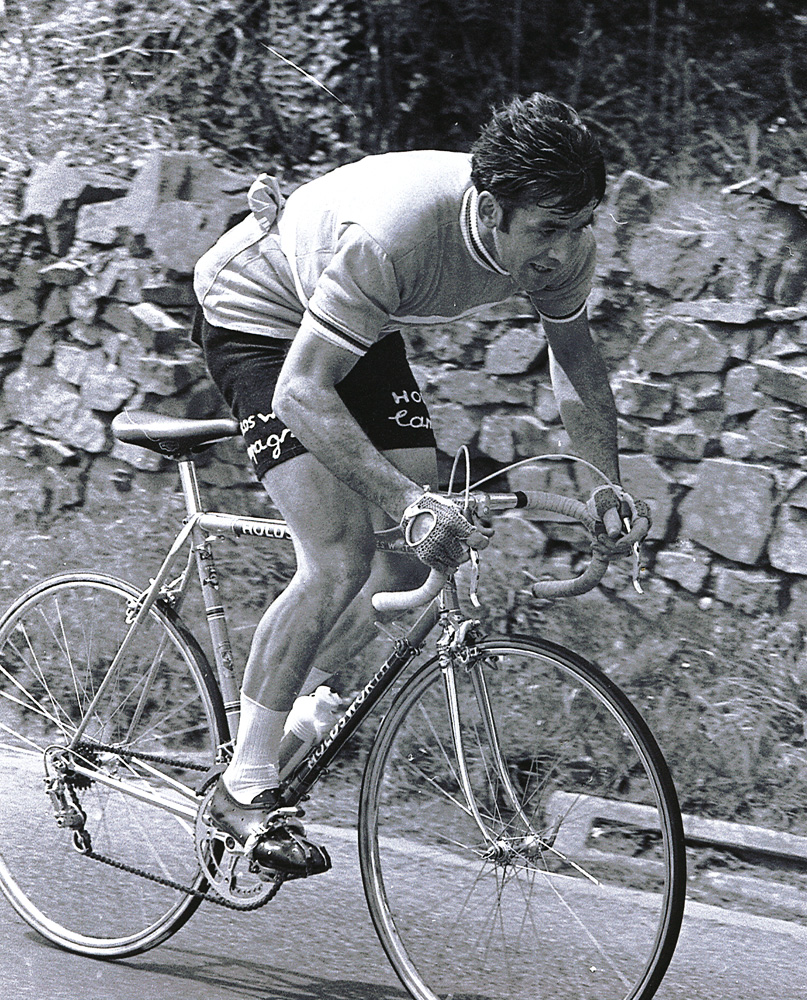
1971 - Les West. It’s a strange fact
that no Milk Race winner was ever awarded the Bidlake. Bill Bradley
won the race twice in succession, and Les West won in 1965 and 1967,
but neither of them was chosen. Perhaps the committee felt that they
had missed a trick here, for West was given the prize in 1971,
nominally for his RRA London-Portsmouth record, but probably in
reality for his string of major road-race victories over many years.
|
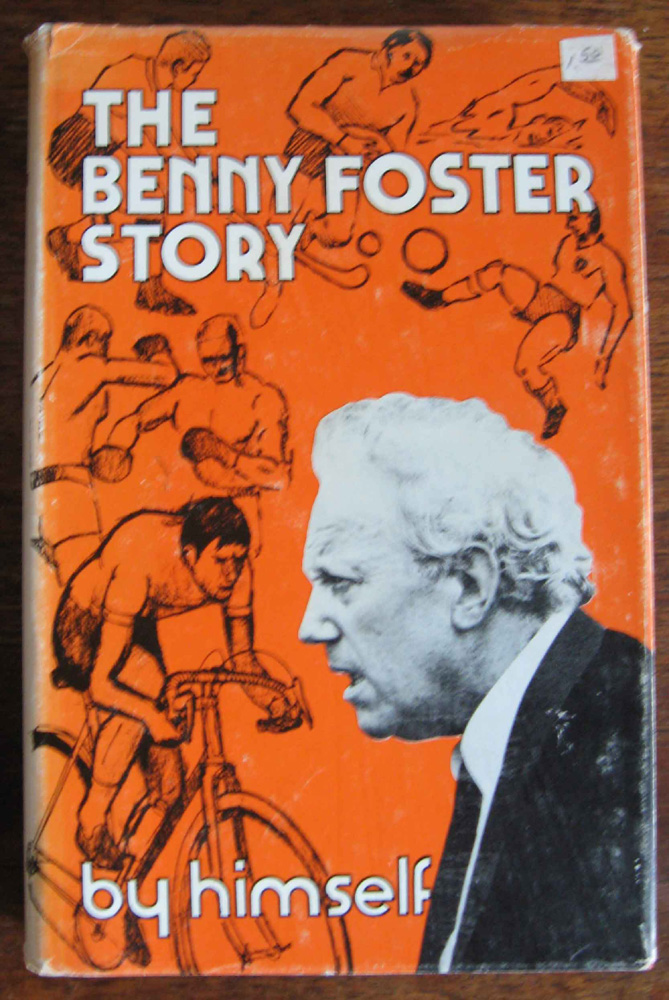
1970 - Benny Foster
was recognised
for his work as organiser-director of the World Championships in
Leicester. |
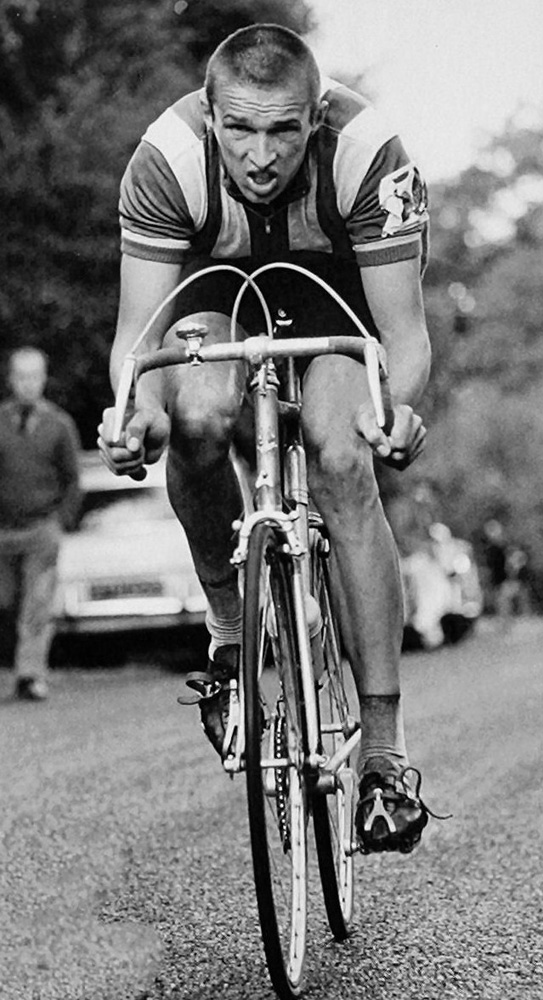
1969 - Roy Cromack brought the
Bidlake back to time-trialling when he cracked the toughest of the
long-distance barriers, the 500-mile 24-hour ride. He reached 507
miles in brilliantly planned and controlled ride, which was all the
more remarkable for being the only 24 he ever rode in his life.
|
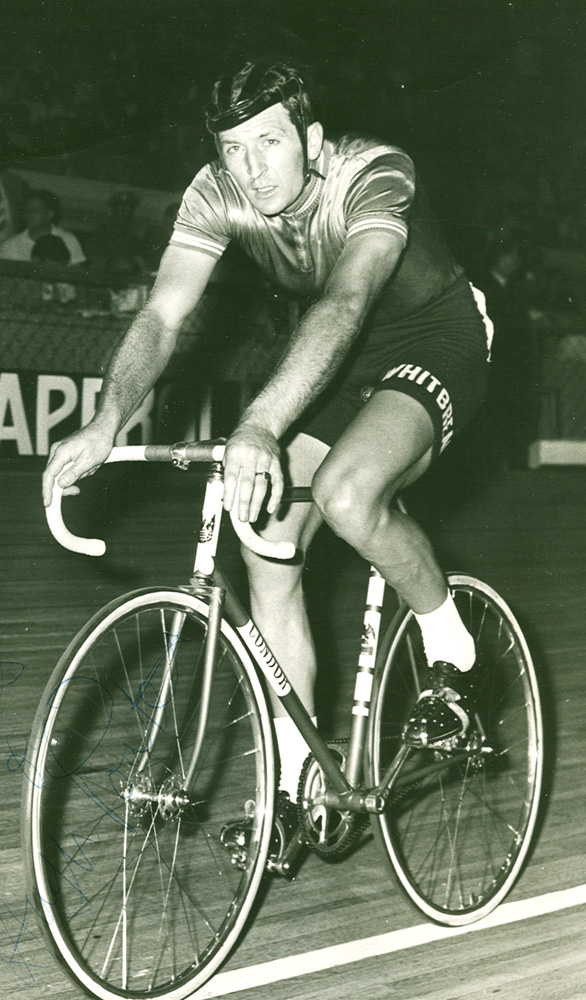
1968 - Hugh Porter continued the run
of British track successes at World Championship level, when he took
the World Professional Pursuit title in Rome, the first of the four
titles which he would win, an unequalled record. |
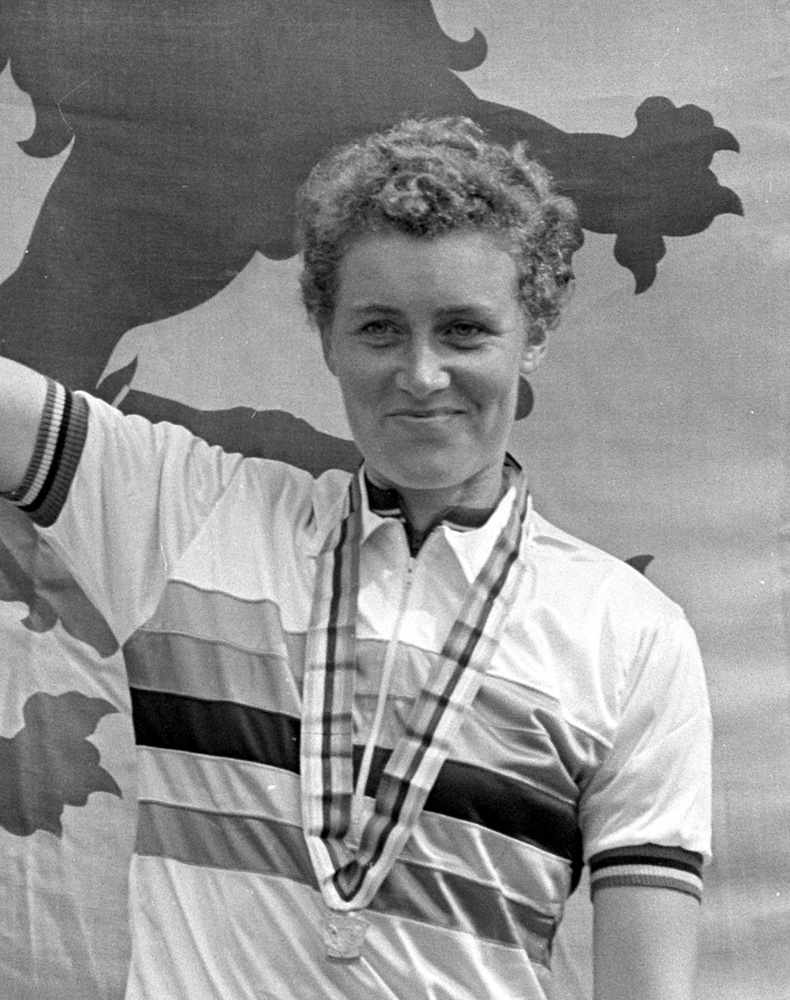
1967 - Beryl Burton was awarded an
unprecedented third Bidlake trophy, for her runaway victory in the
women’s World Road Race Championship, and for her 12-hour time-trial
record of 277.5 miles, which also exceeded the men’s record – the
first time such a thing had ever happened. Given that she had won
two Bidlakes already, this was a slightly controversial award. In
1967, Graham Webb had won the men’s World Amateur Road Race
Championship, while Les West had won his second Milk Race, and both
of them had a strong claim on the Bidlake. Since there can only be
one award per year, it is clear that in certain years some
outstanding performances will go unrecognised. |
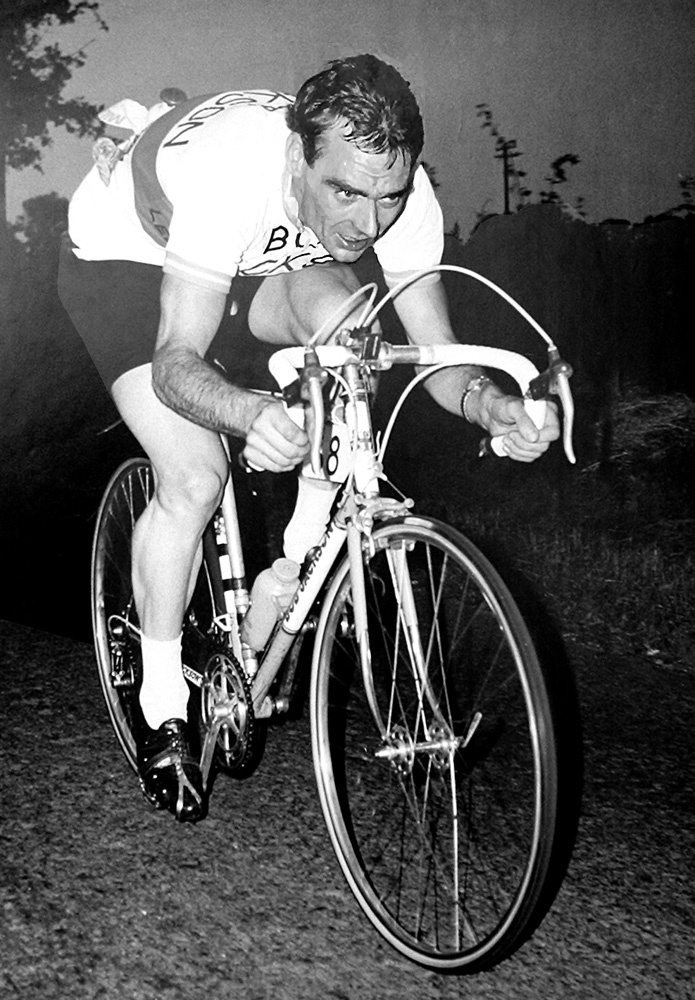
1966 - Arthur Metcalfe
was one of
the best amateur roadmen in the country, having won the Milk Race in
1964, but in 1966 he did something unique, first winning the
National Amateur Road Race Championship, then adding the BBAR title
to his record, winning it with three straight rides. He did it to
prove a point, that a good roadman could beat the time-triallists at
their own game; but whether that really is true or not is still
debatable, since no one has ever repeated Metcalfe’s double victory.
|
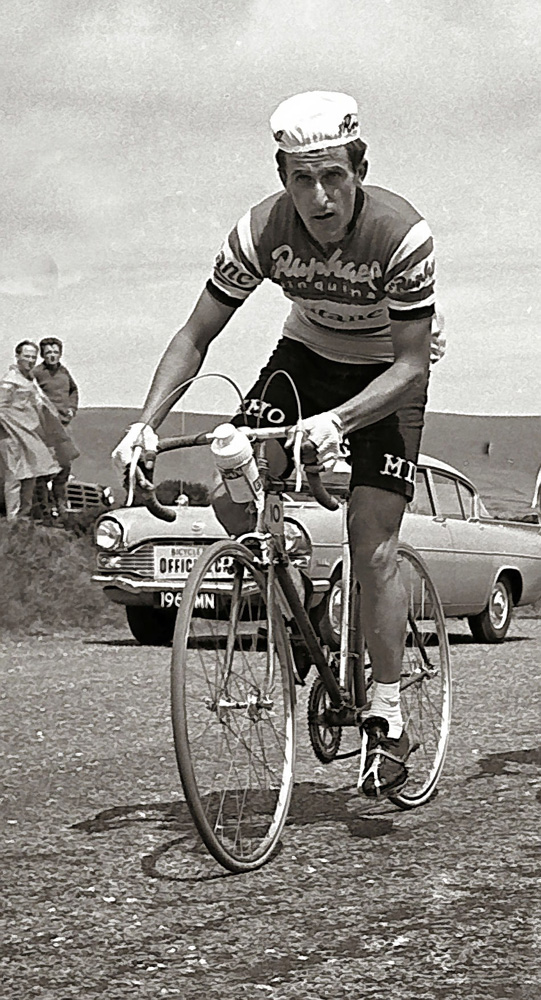
1965 - Tom Simpson
was, like Ray
Booty in 1956, a certainty for the Bidlake, having become the
first-ever British rider to win the World Professional Road Race
Championship. He had already won Bordeaux-Paris, the Tour of
Flanders and Milan-San Remo, and held the yellow jersey in the Tour
de France. He was easily the biggest name in British cycling, the
first ever to reach the top in the elite world of European
road-racing. |
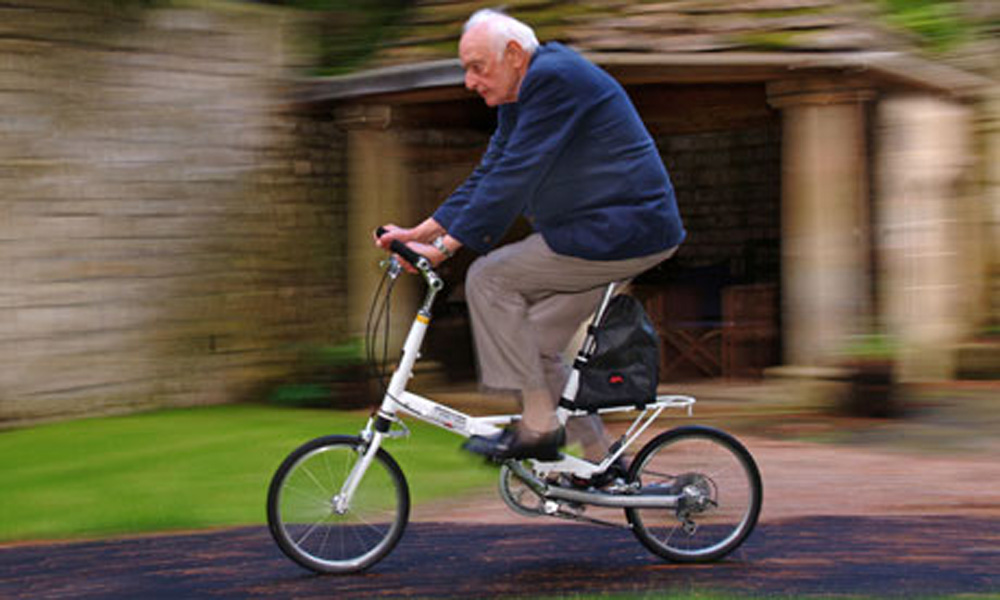 1964
- Alex Moulton had
revolutionised bike design the previous year with his new concept of
the small-wheeled bicycle with its suspension frame. This was the
first entirely new development in bike-building since the safety
bike replaced the penny-farthing in the late 1880s. The Moulton was
smart, compact, new and neat, ideal for the mood of the sixties and
it provided a huge surge of renewed interest in cycling. 1964
- Alex Moulton had
revolutionised bike design the previous year with his new concept of
the small-wheeled bicycle with its suspension frame. This was the
first entirely new development in bike-building since the safety
bike replaced the penny-farthing in the late 1880s. The Moulton was
smart, compact, new and neat, ideal for the mood of the sixties and
it provided a huge surge of renewed interest in cycling.
|
| 1963 - Leslie C. Carter
was given
the award for his work in devising the National Schoolboys
Championship, which culminated in an entry of nearly 2000 riders in
this year. |
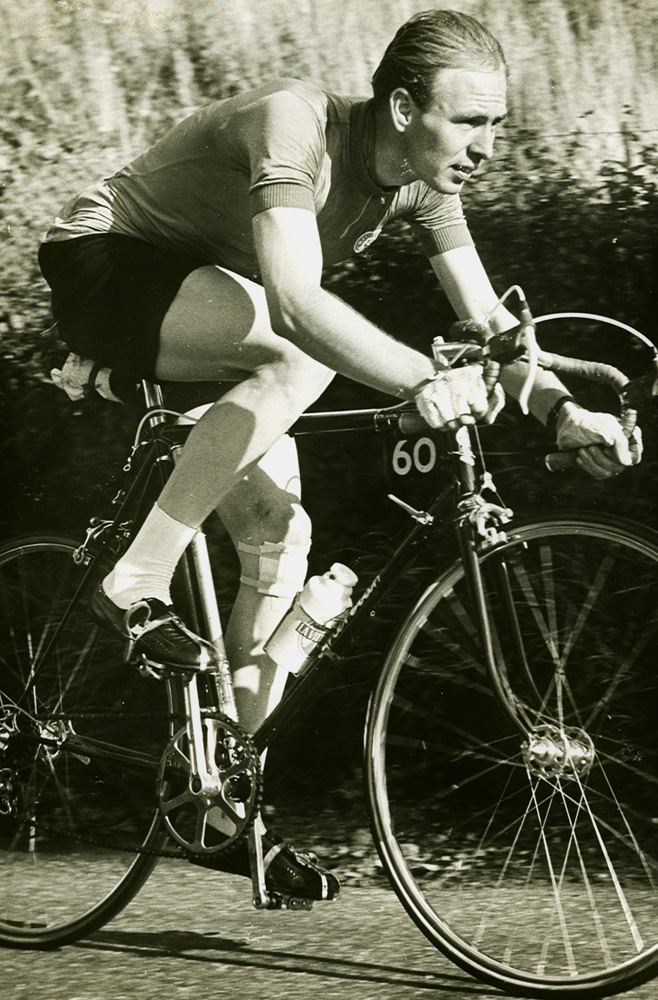
1962 - Frank Colden gave British
time-trialling one of its most exciting seasons ever, when he won
the BBAR crown with new competition records at 50 and 100 miles,
then crashed in the 12, and had to ride again a fortnight later. His
100 on the Bath Road became legendary, as he took four minutes from
Booty's record, and became only the second man in the sub-four-hour
club. Sadly, following this great season, he slipped out of the
sport, having gone as far as he believed possible with new standards
of speed, and the sacrifices necessary to achieve them. |
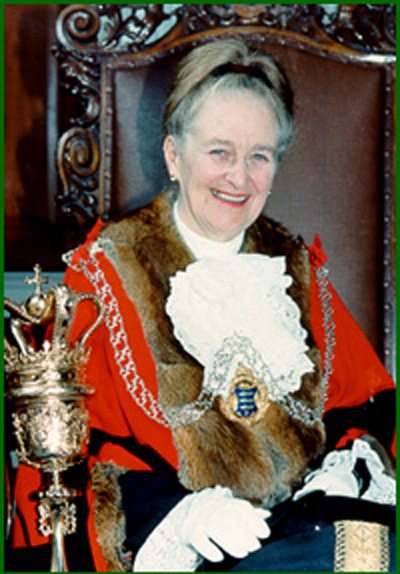
1961 - Eileen Gray was one of the
pioneers of women’s racing in the 1950s, and president of the
Women’s Cycle Racing Association. She led the campaign to set up a
women’s World Championship, which was finally accepted by the U.C.I.
in 1958. The championships came to Britain in 1961, but this time
Beryl lost her pursuit crown by one tenth of a second. |
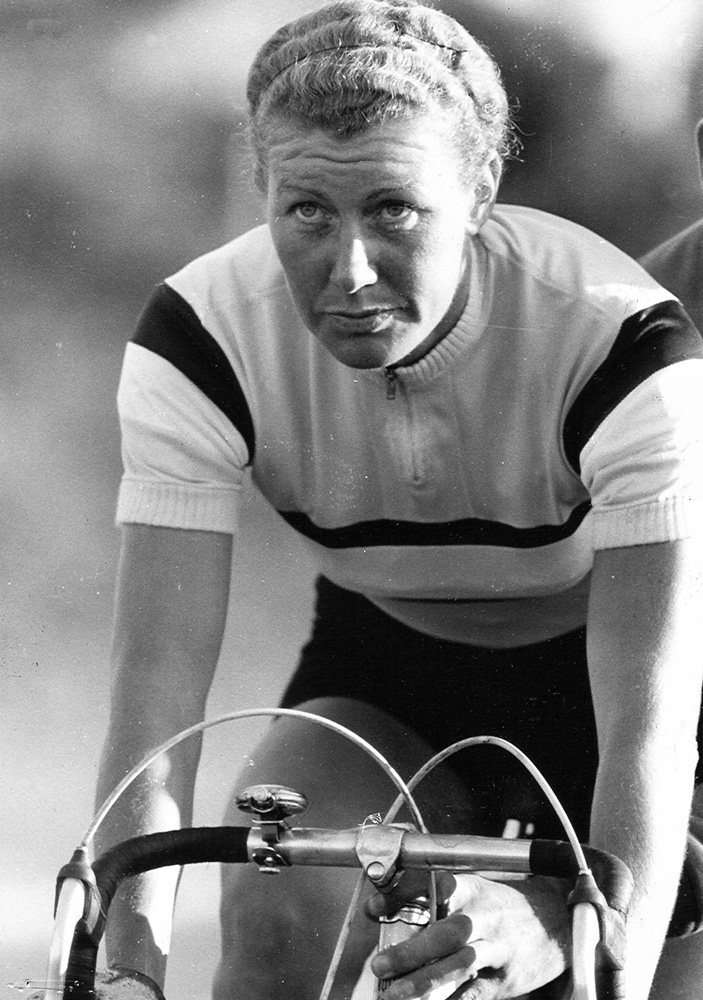
1960 - Beryl Burton’s
unique ability
took her to even greater heights, giving her a double victory in the
women’s World Championships, in the pursuit again, and in the road
race. Once again she made a clean sweep of the domestic
competitions, and fully justified an unprecedented second
consecutive Bidlake award. |
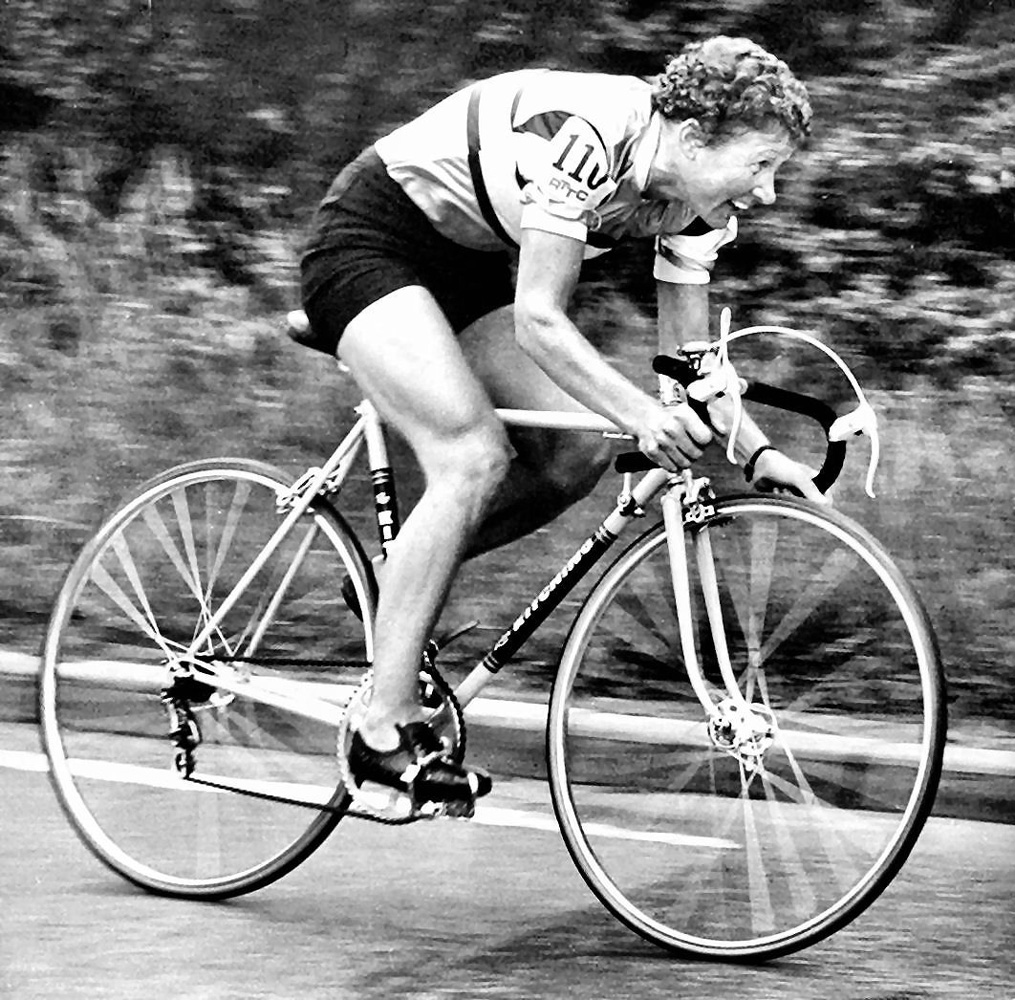
1959 - Beryl Burton had already
arrived as a multiple national champion in 1958, and in 1959 she
repeated her success in home competition, but she went much further
in taking the pursuit title in the women’s World Championships. |
| 1958 - Reginald C. Shaw was the
founder of the National Safe Cycling Scheme for training child
cyclists. In the 1950s children in their thousands used bicycles on
the public roads in a way that they no longer seem to do, and Shaw’s
scheme helped to raise awareness of their safety. He had already
been given the MBE for his work. |
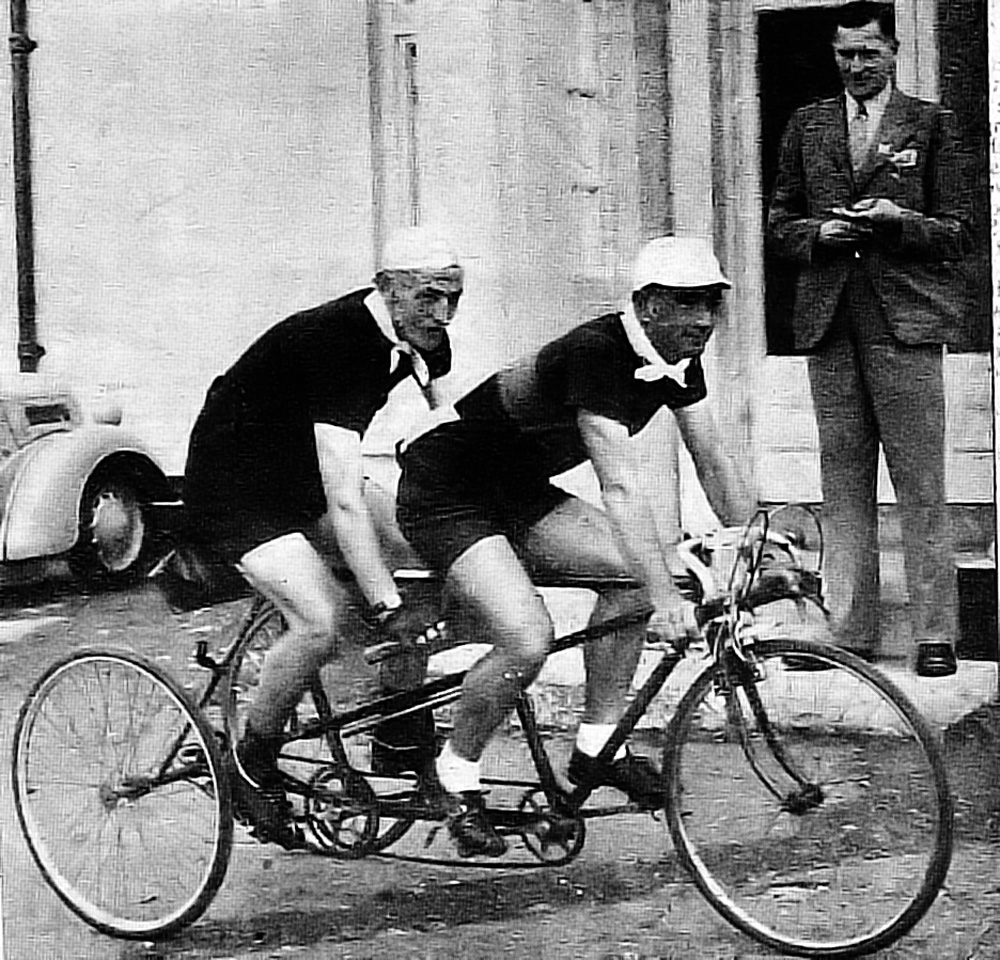
1957 - Albert Crimes was the
greatest trike-man in Britain – except for John Arnold. But Arnold
was forced out of the sport through injury soon after he and Crimes
had set their legendary End-to-End record together on the tandem
trike. Crimes continued as a solo rider, and in this year he set a
new End-to-End solo trike record. He had not scheduled to go on for
the 1000, but in the following year he took that record too, the
climax of a great career. |
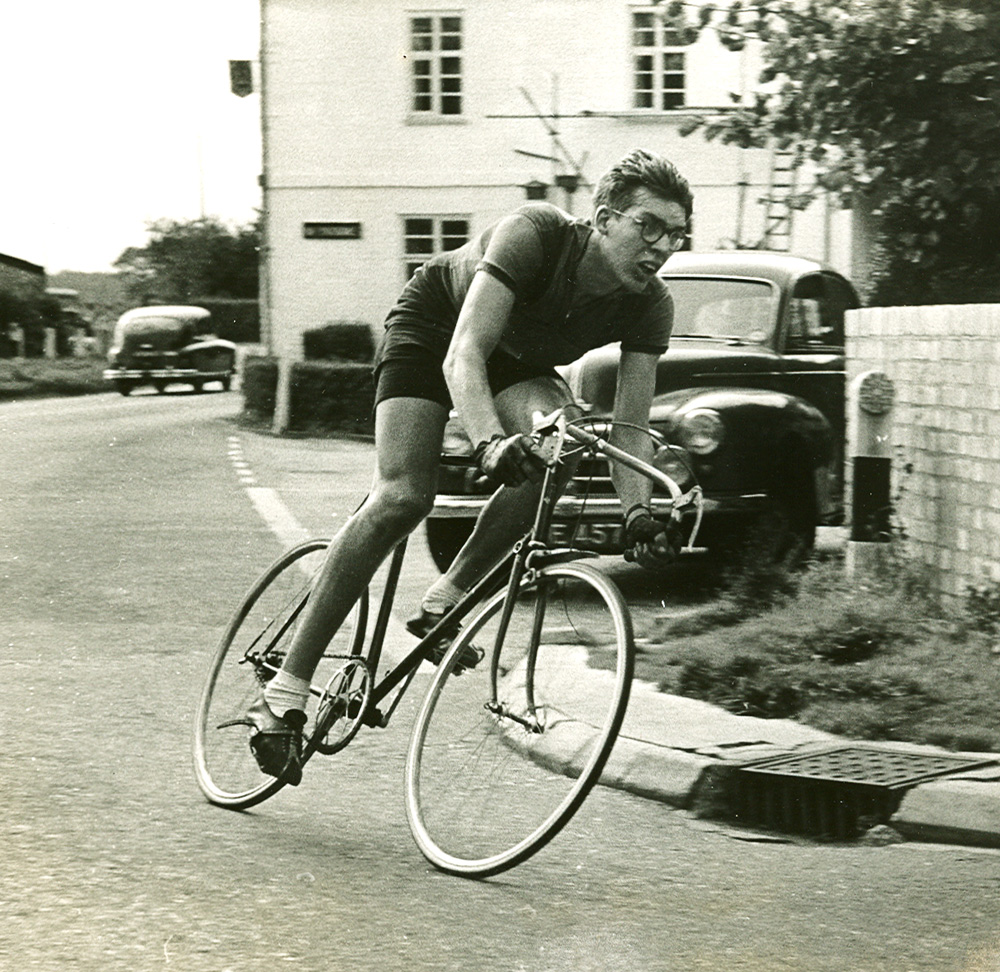
1956 - Ray Booty. If ever a man was
a stone-cold certainty for the Bidlake it was Booty in 1956, when he
achieved the magic landmark of time-trialling, the first
sub-four-hour 100, with his 3:58:28 in the classic Bath Road event
in August. A few weeks later he set what seemed an incredible,
superhuman straight-out 100 record of 3:28:40. Modest, humorous,
relaxed, but for many years invincible, Booty was a unique figure in
British time-trialling, and a giant of the sport. |
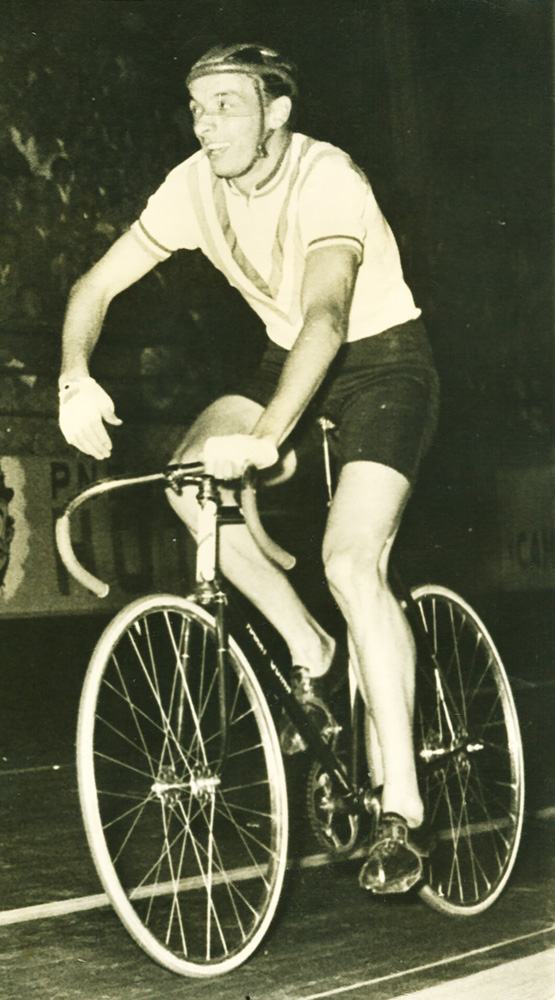
1955 - Norman Sheil. The 1950s were
great days for British pursuiting, and no one went higher than Shiel,
who won the world amateur title on the famous Vigorelli track at
Milan. It is sometimes forgotten that the final was an all-British
affair, with Pete Brotherton taking the silver medal. In the
following year, Sheil lost his way a little, but came back for a
second world title in 1958. He was also a double gold medallist at
the Commonwealth Games - in 1954 and 1958. |
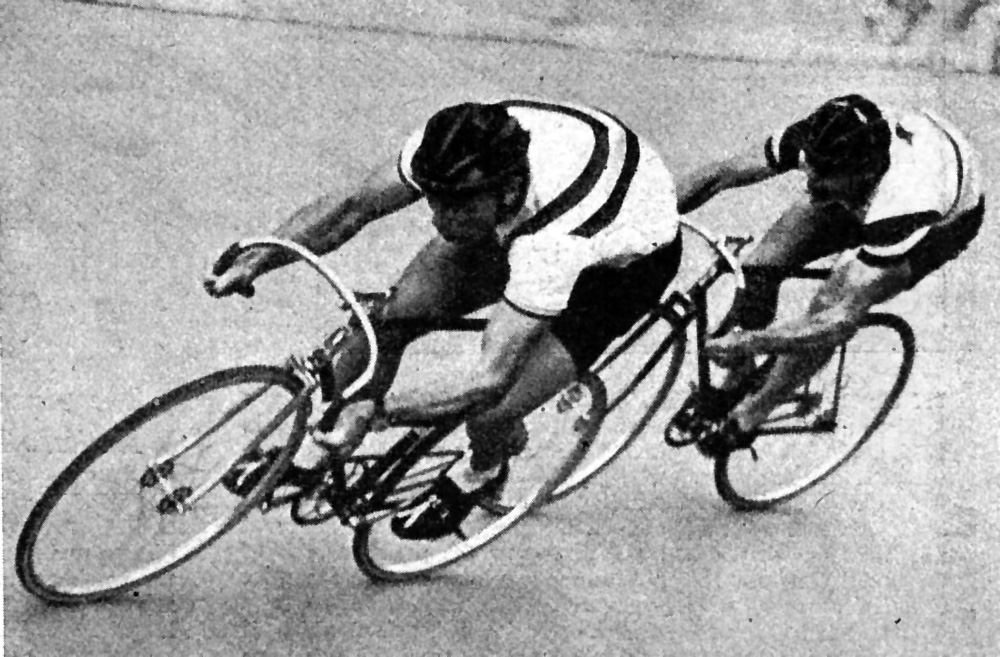 1954
- Cyril Peacock won the World
Amateur Sprint Championship in Cologne, and after turning
professional he was inevitably seen as the next Reg Harris. However,
Peacock failed to score a single significant victory, and retired
two years later. He was a World Champion who is remembered,
ironically, as a failure because nothing comparable followed his
great victory. 1954
- Cyril Peacock won the World
Amateur Sprint Championship in Cologne, and after turning
professional he was inevitably seen as the next Reg Harris. However,
Peacock failed to score a single significant victory, and retired
two years later. He was a World Champion who is remembered,
ironically, as a failure because nothing comparable followed his
great victory. |
| 1953 - John Arnold. The National
24-hour championship this year witnessed one of the most remarkable
results ever seen, when Phil Carter won the event by just two miles
from Arnold, riding a trike. Arnold’s figures of 457.33 added a
staggering 35 miles to the existing trike record of the time. In
1954 Arnold would team up with Albert Crimes to set an End-to-End
record on the tandem trike which may perhaps never be beaten.
|
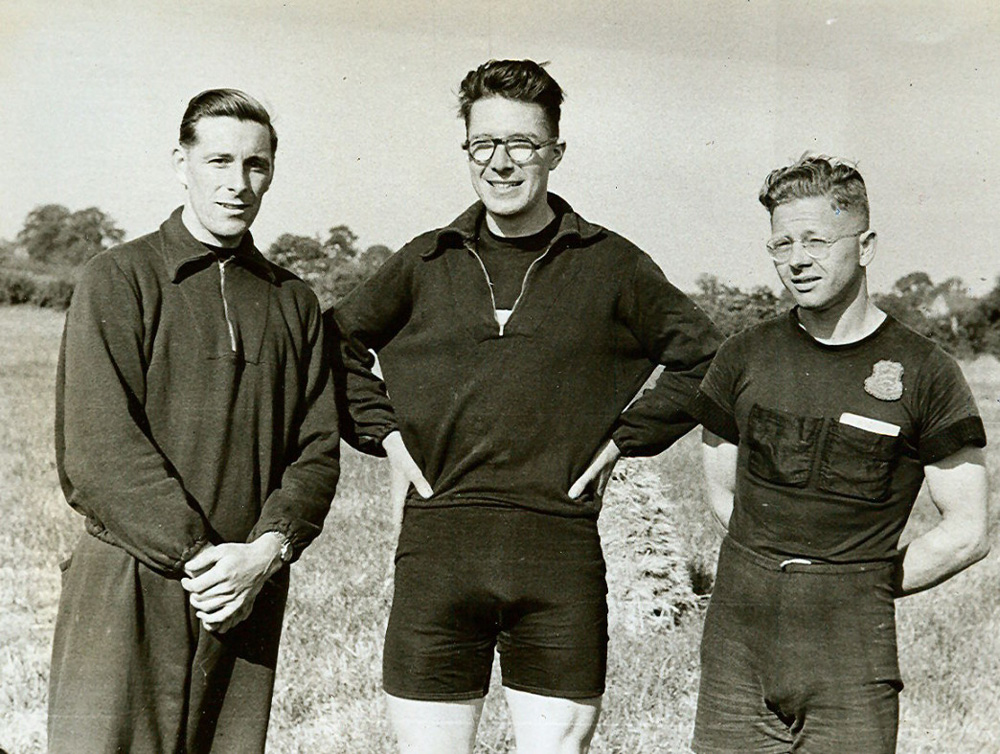
1952 - Keith Bentley was a
specialist 50-miler, who in this year won the National Championship
and broke competition record twice. He put up four of the five
fastest 50-mile times of the year. |
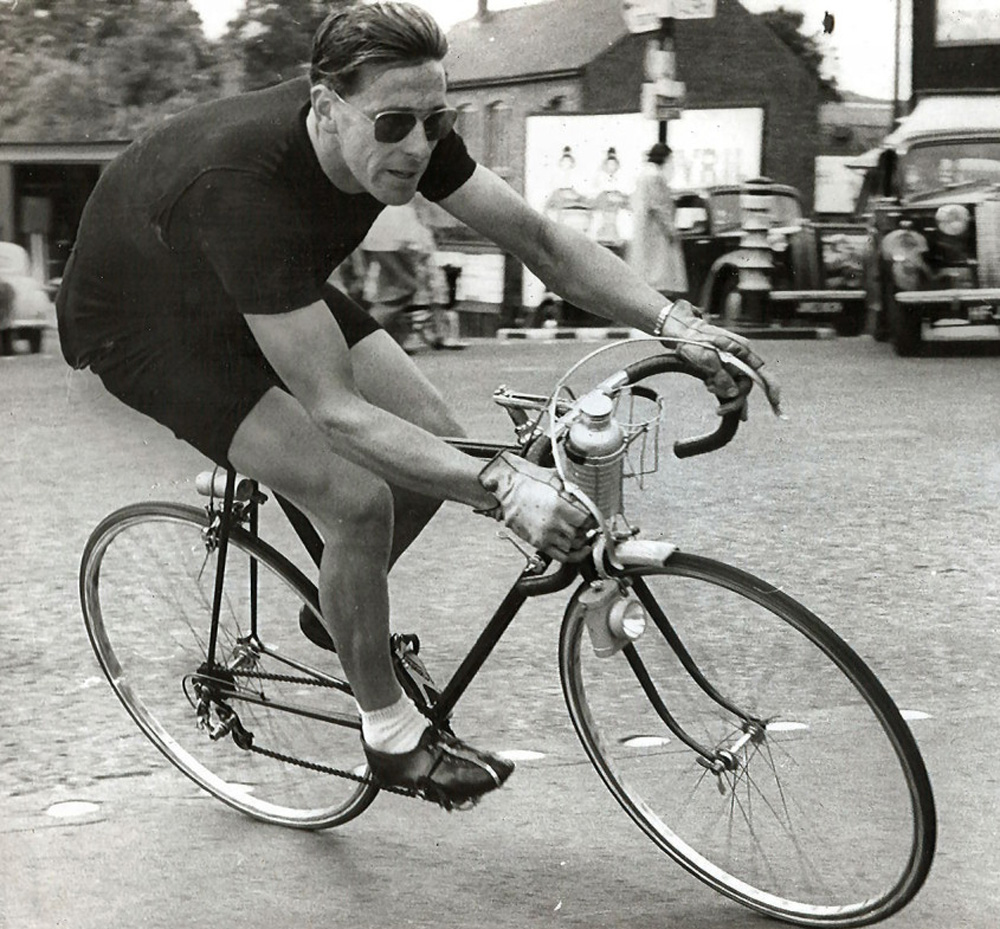
1951 - Ken Joy’s career ran parallel
with Eileen Sheridan’s. He won the BBAR competition four times in
succession from 1949-52, the first man since Southall to win it more
than once. Like Eileen he won multiple national championships and
set multiple records, then he too turned pro for Hercules and set
many RRA records. Outstanding among these was his Liverpool-London,
finishing inside 8 hours for the more than 200 miles, figures which
still stand today. |
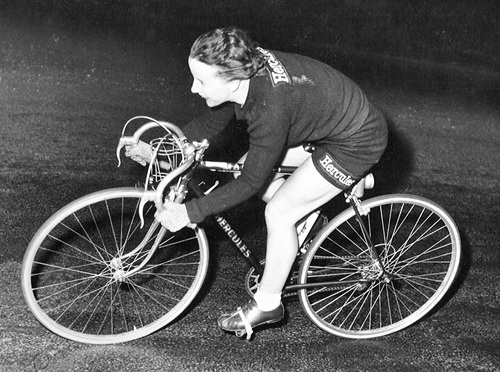 1950
- Eileen Sheridan
was the great
star of post-war women’s cycling, taking the women’s BAR in 1949 and
1950, and numerous records and national championships on the way.
She was an obvious choice for the Bidlake, but had she not won it in
1950 she would certainly have got it later, for she rode as a
professional for Hercules from 1952 to 1954 and broke every single
women’s RRA record in the book, breaking those that Marguerite
Wilson had set up. 1950
- Eileen Sheridan
was the great
star of post-war women’s cycling, taking the women’s BAR in 1949 and
1950, and numerous records and national championships on the way.
She was an obvious choice for the Bidlake, but had she not won it in
1950 she would certainly have got it later, for she rode as a
professional for Hercules from 1952 to 1954 and broke every single
women’s RRA record in the book, breaking those that Marguerite
Wilson had set up. |
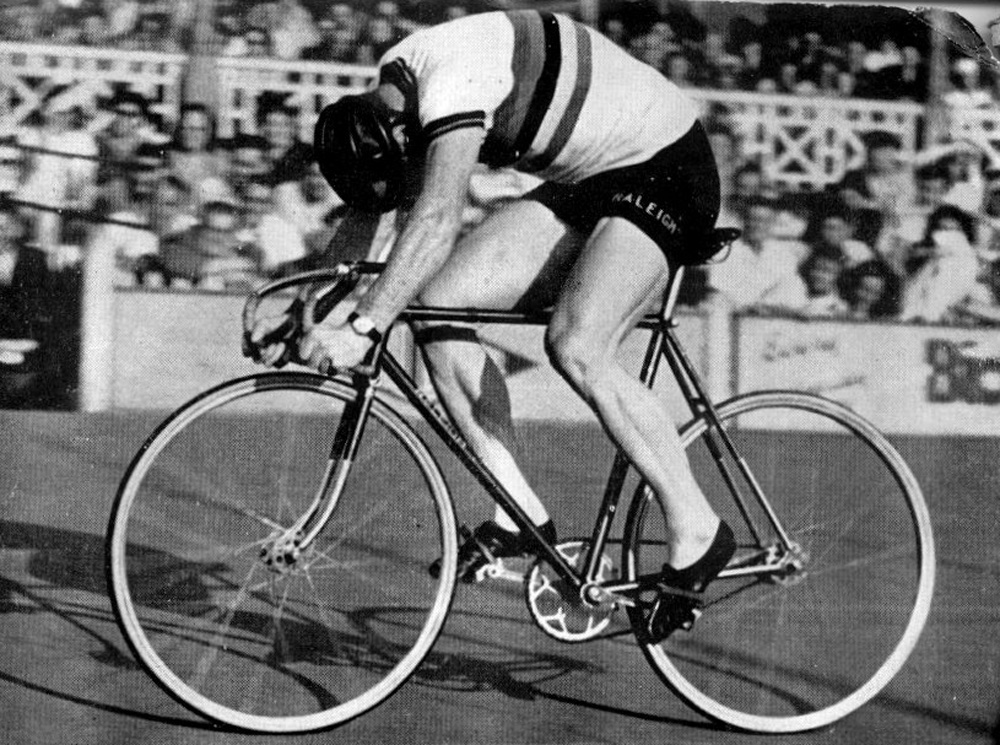 1949
- Reg Harris was the first
person to be given two Bidlake awards. He had turned professional
after the London Olympics, and in his first pro season he added the
professional world title to his amateur one. He would add three more
pro world titles during his career. In terms of sheer speed he was
virtually unbeatable, but he was less happy with three- and four-up
matches, otherwise he might have won even more. 1949
- Reg Harris was the first
person to be given two Bidlake awards. He had turned professional
after the London Olympics, and in his first pro season he added the
professional world title to his amateur one. He would add three more
pro world titles during his career. In terms of sheer speed he was
virtually unbeatable, but he was less happy with three- and four-up
matches, otherwise he might have won even more. |
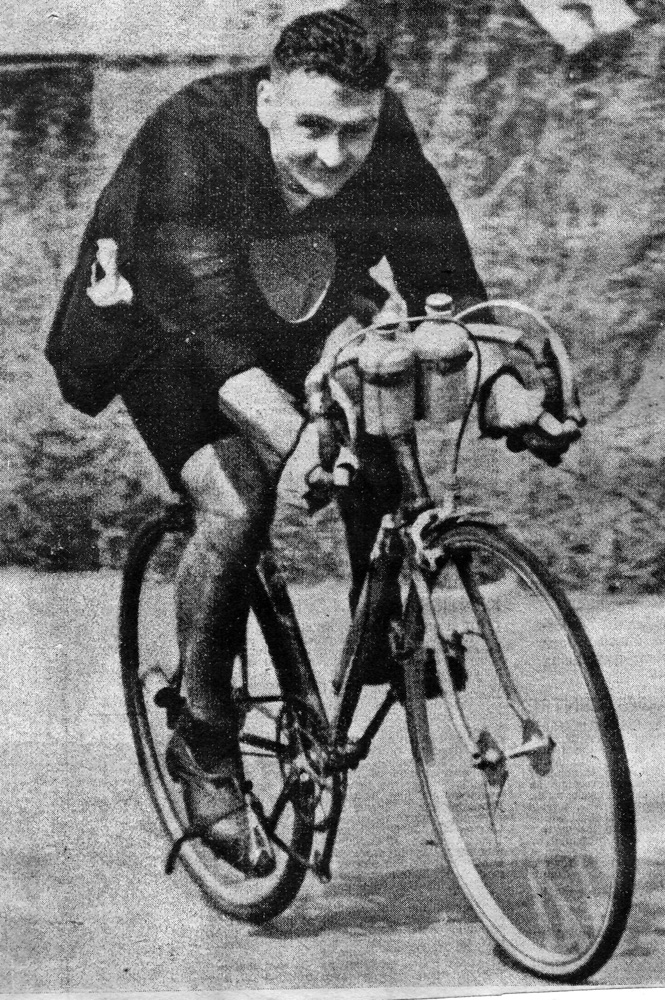
1948 - Gordon Basham of the Wessex
RC won the first-ever National 24-hour Championship, setting a
magnificent new competition record in the process of 454.37 miles,
adding almost 10 miles to the previous figures. Basham was notable
for drinking several pints of beer during his ride, but he always
emphasised that it was mild beer. |
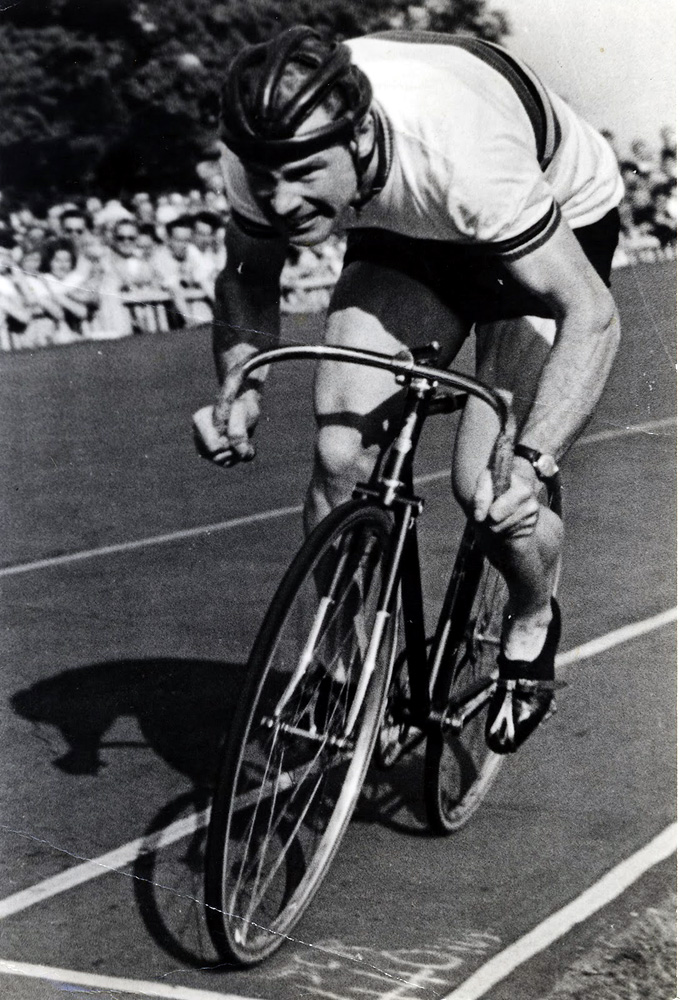
1947 - When
Reg Harris won
the World Amateur Sprint title in Paris, British cycling was
thrilled to have a British world champion at last, the first since
1922. Harris would soon go on to become still more celebrated, and a
household name in this country. Throughout the 1950s, any cyclist
moving at speed on the roads of Britain was likely to hear calls of,
“Who do you think you are, Reg Harris?” He was seen as a
near-certainty for an Olympic gold in London in 1948, but finished
with the silver medal, following injuries in a car crash just before
the Games. |
| 1946 - Albert Derbyshire. It took a
long time for a BAR champion to be given the Bidlake. The
competition had been founded in 1930, but it was 1946 before
Derbyshire was honoured by the Bidlake committee. Derbyshire had
already won a slimmed-down version of the competition run in 1944,
but in 1945 Jock Allison won the first full post-war edition. Since
he was the first Scotsman (and still the only one) ever to win it,
and was only twenty years old, this young coal-miner might perhaps
have been given the Bidlake in 1945, but he was not. However in 1946
Derbyshire’s superiority in time-trialling was complete: he won
three national championships and the BBAR, and broke competition
records in the 50 and the 100. He would take the BBAR title again in
1947. |
| 1945 - There was no award. |
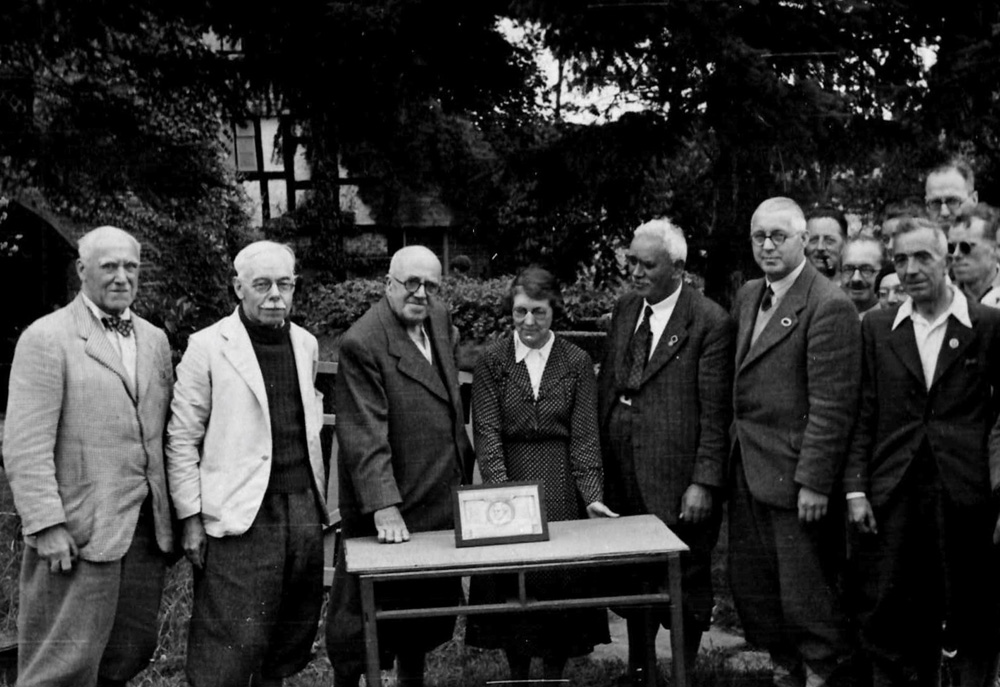 1944
- Frank Patterson. 1944
- Frank Patterson.
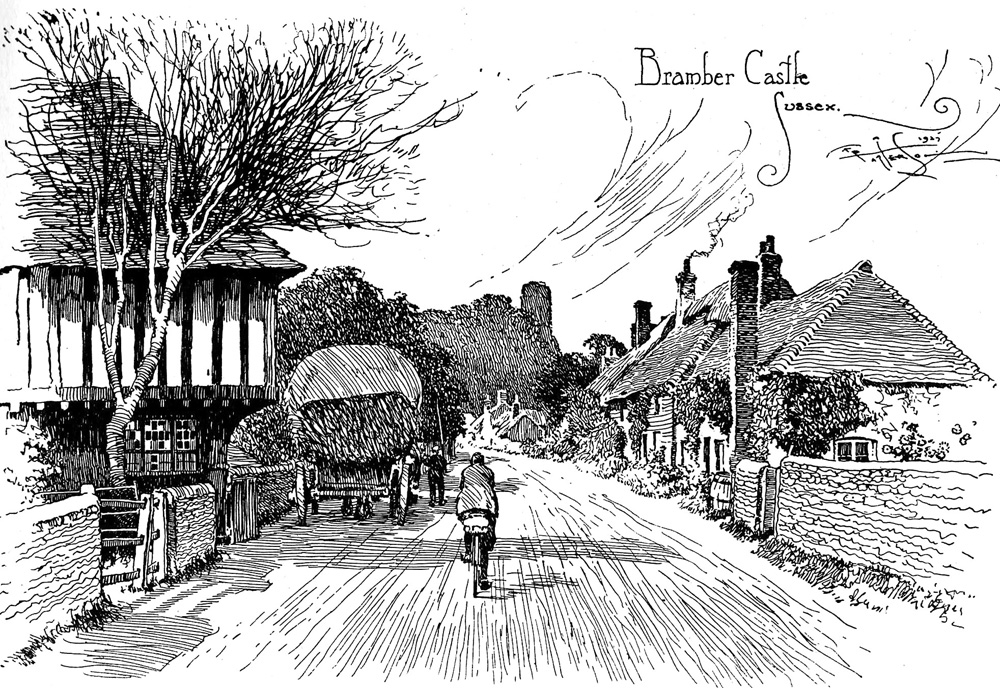 This year’s
award was to a man whose contribution to cycling was truly unique,
yet in a way detached from it. Frank Patterson was superb graphic
artist, whose drawings of cycling subjects had appeared in Cycling
magazine for 51 years. His pictures showed racing and touring
cyclists against the background of Britain’s countryside: the open
road, wooded hillsides, delightful villages, picturesque old inns
and tea-shops, rivers flowing under ancient bridges, summer
sunshine, rainstorms and snow-scenes. His work presented an idyllic
picture of Britain which was unrealistic in that it was so
selective, but it inspired thousands of urban cyclists to go out and
explore the countryside, looking for scenes like those which he
drew. Patterson himself was a strange, reclusive man, who was
certainly not an active cyclist himself, except in his younger days,
but his work was much-loved and inspirational through two
generations. This year’s
award was to a man whose contribution to cycling was truly unique,
yet in a way detached from it. Frank Patterson was superb graphic
artist, whose drawings of cycling subjects had appeared in Cycling
magazine for 51 years. His pictures showed racing and touring
cyclists against the background of Britain’s countryside: the open
road, wooded hillsides, delightful villages, picturesque old inns
and tea-shops, rivers flowing under ancient bridges, summer
sunshine, rainstorms and snow-scenes. His work presented an idyllic
picture of Britain which was unrealistic in that it was so
selective, but it inspired thousands of urban cyclists to go out and
explore the countryside, looking for scenes like those which he
drew. Patterson himself was a strange, reclusive man, who was
certainly not an active cyclist himself, except in his younger days,
but his work was much-loved and inspirational through two
generations. |
| 1943 - George Herbert Stancer.
It
was another establishment figure who took the award: G.H.Stancer was
regarded as the elder statesman of British cycling, the position
that Bidlake himself had held until his death. He was the editor of
Cycling magazine from 1910 to 1920, the Secretary of the CTC from
1920 onwards, and President of the Road Records Association from
1936. He also happened to be Chairman of the Bidlake Trust itself,
and one may wonder if the committee wasn’t showing a certain a lack
of imagination in bestowing this honour on its own Chairman,
especially since Frank Urry was also a committee member. Stancer
differed from Bidlake in that he had never been a great racing man
himself. He did however actively support women’s entry into racing,
which Bidlake certainly did not. |
| In 1942 there was no award. |
| 1941 - Arthur Gillott. The very
limited wartime racing programme made it natural to look at the
field of services to cycling, and the award was presented to Arthur
Gillott, bicycle retailer and founder of the Institute of Cycle
Traders and Repairers, which aimed to introduce professional
standards into the cycle trade. |
| 1940 - There was no award. The war
had disrupted not only racing but normal life to such an extent that
no decision on a winner could realistically be made. One casualty of
the war was the plaques themselves: their manufacture was banned by
the Board of Trade, and photographs had to be given, the plaque
itself to be awarded later. |
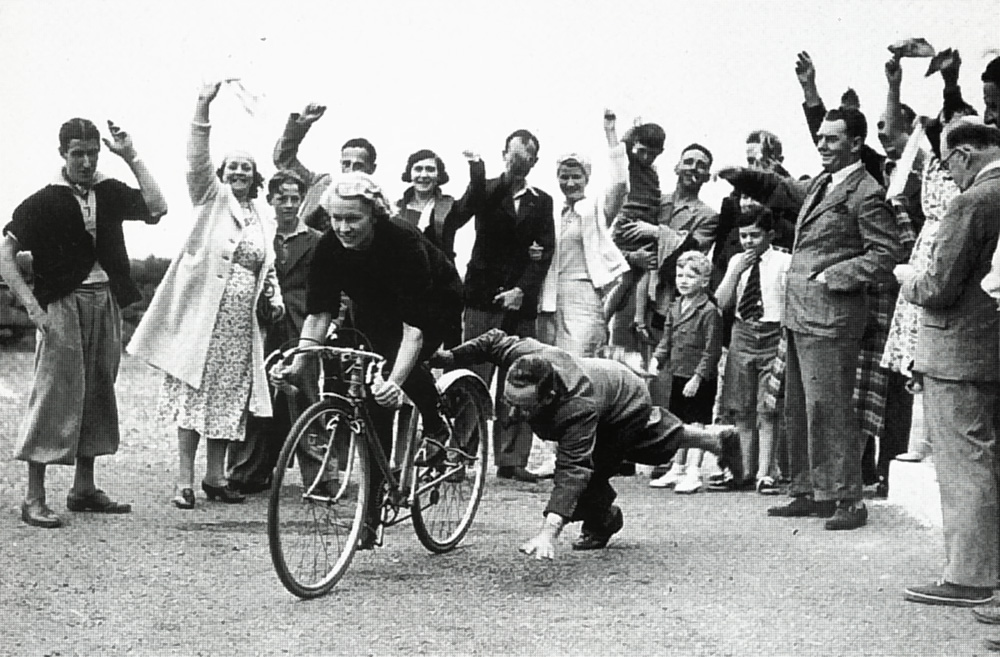 1939
- Marguerite Wilson.
At the end
of 1938 the rules of Bidlake award were amended to make it clear
that women were eligible for the award. This was probably no
accident, for Marguerite Wilson had just turned professional for
Hercules, and during 1939 she proceeded to re-write the record books
of the Women’s RRA, breaking no less than eleven records. The award
was made specifically for her End-to-End and 1000-mile rides.
Marguerite was the “blond bombshell” of English cycling, attractive
and vivacious, and also immensely strong. She would break more
records the following year, before the war ended her career
prematurely. 1939
- Marguerite Wilson.
At the end
of 1938 the rules of Bidlake award were amended to make it clear
that women were eligible for the award. This was probably no
accident, for Marguerite Wilson had just turned professional for
Hercules, and during 1939 she proceeded to re-write the record books
of the Women’s RRA, breaking no less than eleven records. The award
was made specifically for her End-to-End and 1000-mile rides.
Marguerite was the “blond bombshell” of English cycling, attractive
and vivacious, and also immensely strong. She would break more
records the following year, before the war ended her career
prematurely. |
| 1938 - Frank Urry
was honoured for defending the interests of cyclists on the
Transport Advisory Council, a governmental body which was attempting
to get to grips with road traffic management and road safety. Urry
was one of the top-ranking officials who served on many committees,
and one of cycling’s establishment, and it is slightly surprising
that Shake Earnshaw was not preferred, for the brilliant
record-breaking rides that gave him his clear victory in the BAR
competition this year. |
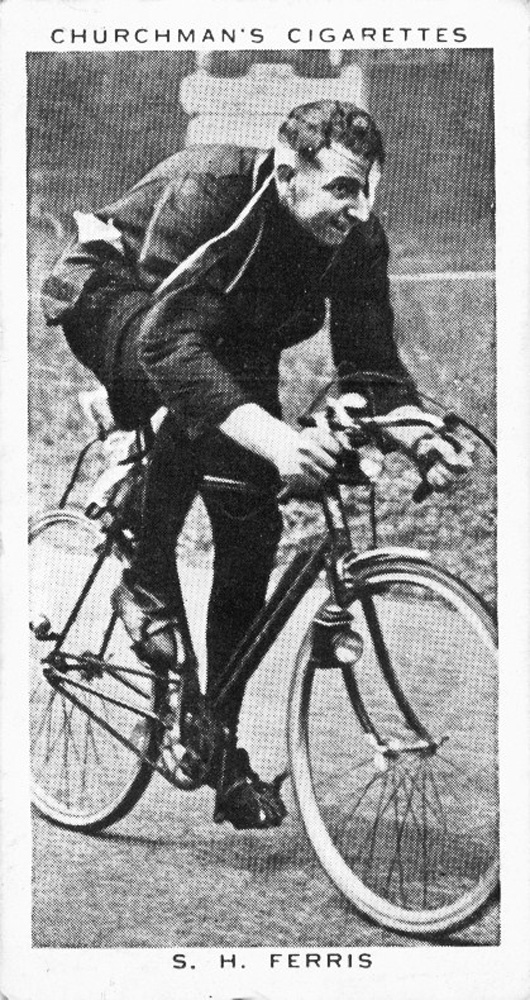
1937 - Syd Ferris.
For the second
time in three years, the End-to-End record-breaker captured the
Bidlake award: Syd Ferris took two and a half hours from Opperman’s
time. Oppy was a popular character in Britain, but no doubt there
was a sigh of satisfaction that this supreme record had been
recaptured by a home rider. Ferris also took the 1000-mile record,
bringing it inside three days for the first time. Ferris rode as a
professional for Sturmey-Archer, and, as well as being a vegetarian,
he was a distinctive figure, with an eye-patch over his left eye.
|
| 1936 - Edward Southcott.
This was
the first award for services to cycling rather than racing, and the
recipient was Edward Southcott, for his services to the British
cycling team that went to the Berlin Olympics. This was something
very strange about this award, for it was never explained in public
exactly what Southcott had done, but a number of people knew the
truth and eventually it leaked out. Apparently when the track team
unpacked their equipment, they found that virtually every one of
their racing tubs was faulty and could not be used. Southcott, who
was President of the Catford CC, was in Berlin as part of the
judging panel. He was immediately dispatched back to England to buy
a new consignment of tubs and return as fast as he could to save the
situation. This was quite a little adventure, but one has to wonder
if it was worthy of a Bidlake Prize. And why were the Trust so coy
about it, why could the truth not be told? Britain’s only real
success at the Games was a bronze medal on the track in the team
pursuit, where the fours riders were Hill, Johnson, Mills and King.
In the road race, Charlie Holland was fifth. |
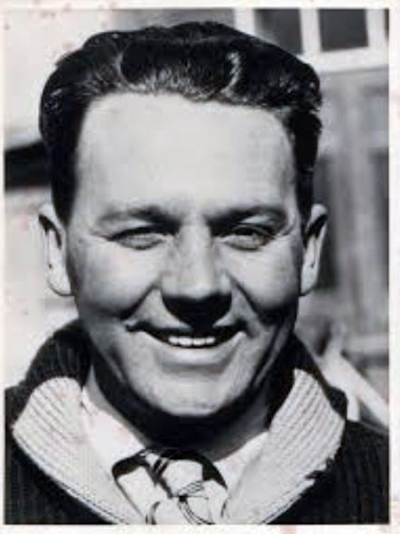 1935
- Frank Southall.
Perhaps the
Bidlake committee had calculated that there was more to come from
the great Frank Southall, and that they would be 1935
- Frank Southall.
Perhaps the
Bidlake committee had calculated that there was more to come from
the great Frank Southall, and that they would be
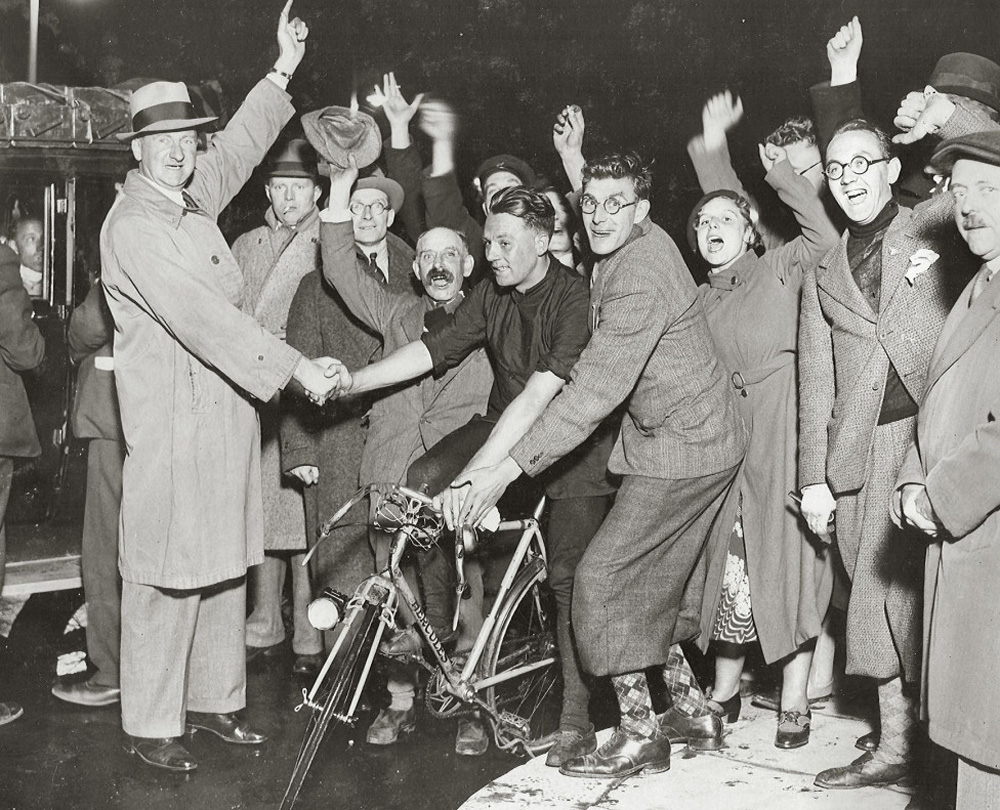 able to honour him
in 1935, and this is exactly what happened, but it was a close-run
thing. Opperman returned to England, this time with two compatriots,
Stuart and Milliken, and the trio proceeded to wipe out many of
Southall’s records from the previous year. Although only 30 years
old, Southall seems to have just passed his peak, for he tried to
recapture these records but failed, until at last by a supreme
effort he sliced just under a minute from Milliken’s
London-Brighton-London record. This was the last record-breaking
ride of his glittering career, and it was enough to win him the
Bidlake, but it had been a tense summer for Southall and his
sponsors at Hercules. Although he received the award for his
Brighton record, there is not much doubt that he was being honoured
for his unrivalled string of victories and records over almost ten
years. able to honour him
in 1935, and this is exactly what happened, but it was a close-run
thing. Opperman returned to England, this time with two compatriots,
Stuart and Milliken, and the trio proceeded to wipe out many of
Southall’s records from the previous year. Although only 30 years
old, Southall seems to have just passed his peak, for he tried to
recapture these records but failed, until at last by a supreme
effort he sliced just under a minute from Milliken’s
London-Brighton-London record. This was the last record-breaking
ride of his glittering career, and it was enough to win him the
Bidlake, but it had been a tense summer for Southall and his
sponsors at Hercules. Although he received the award for his
Brighton record, there is not much doubt that he was being honoured
for his unrivalled string of victories and records over almost ten
years. |
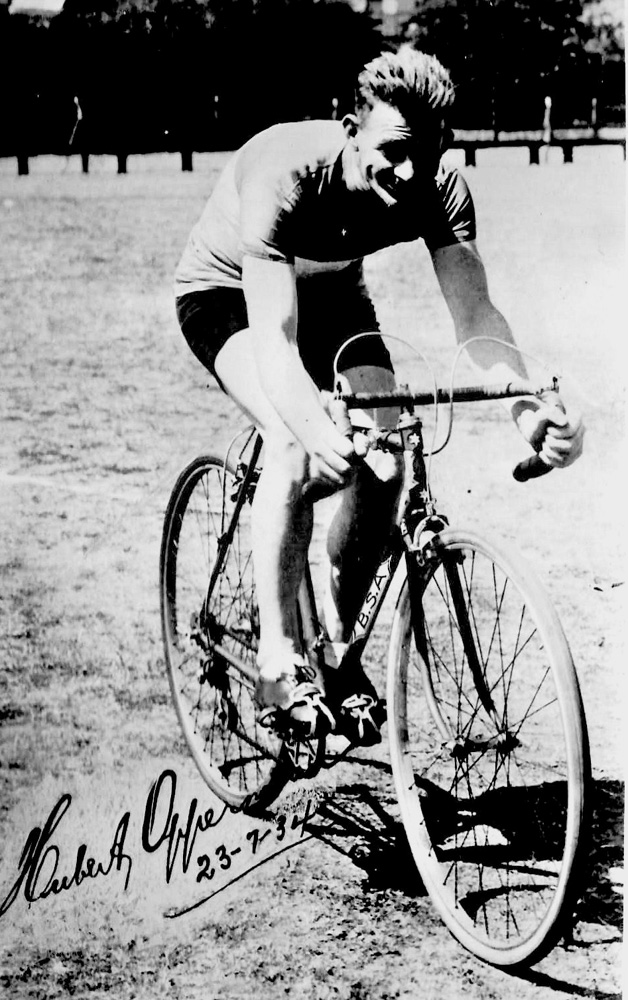 1934
- Hubert Opperman. There can be
no doubt that most people in British cycling expected that the first
Bidlake award would go to the rider who had dominated the sport for
the past ten years, Frank Southall. In 1934 Southall was riding for
Hercules as a professional record-breaker and he had enjoyed a great
season, setting seven new RRA records, including the first-ever 100
inside four hours. The Bidlake award would have crowned his position
as the undoubted king of British cycling. But there was a lion in
his path in the form of Hubert Opperman, who has been brought over
from Australia by BSA to challenge Hercules and Southall. “Oppy” as
he was known, rewarded them by performing the one great feat that
Southall did not and probably could not: he took the End-to-End
record, slicing more than four hours from Jack Rossiter’s 1929
figures. It was a magnificent ride, after which Oppy went on for the
1000-mile ecord too, and the Bidlake committee took the courageous
decision to honour him over Southall. So it was that the award went
in its first year to a professional rather than an amateur, and to
an overseas figure, something that would not happen again for a
long, long time. 1934
- Hubert Opperman. There can be
no doubt that most people in British cycling expected that the first
Bidlake award would go to the rider who had dominated the sport for
the past ten years, Frank Southall. In 1934 Southall was riding for
Hercules as a professional record-breaker and he had enjoyed a great
season, setting seven new RRA records, including the first-ever 100
inside four hours. The Bidlake award would have crowned his position
as the undoubted king of British cycling. But there was a lion in
his path in the form of Hubert Opperman, who has been brought over
from Australia by BSA to challenge Hercules and Southall. “Oppy” as
he was known, rewarded them by performing the one great feat that
Southall did not and probably could not: he took the End-to-End
record, slicing more than four hours from Jack Rossiter’s 1929
figures. It was a magnificent ride, after which Oppy went on for the
1000-mile ecord too, and the Bidlake committee took the courageous
decision to honour him over Southall. So it was that the award went
in its first year to a professional rather than an amateur, and to
an overseas figure, something that would not happen again for a
long, long time. |
| Since the first Bidlake award was
presented to Hubert Opperman in 1934, the world of British cycling
has clearly changed out of all recognition. The committee in those
early days cannot have imagined that the award would ever be given
to British world champions or Tour de France winners, in fact they
would probably never have considered that a British rider would even
take part in the Tour. They probably did not foresee that so many
women would feature in the list either. In one way however, the
Bidlake was ahead of its time in being open to amateurs and
professionals alike. It has always been generous too in recognising
the work of behind-the-scenes figures in the sport, as well as the
great riders. Presenting the award now is more complex than it used
to be because the sport has so many facets, and because we live in
an intensely publicity-conscious world in which so many achievements
clamour for our attention. The Bidlake award has been part of the
British cycling scene from its inception. It has been a symbol of
excellence which each new winner felt it an honour to be given it,
because of all those great riders who had received it in the past.
This year we celebrate eighty-six years of the Bidlake Trust, and we
look forward with confidence to reaching its centenary.
|